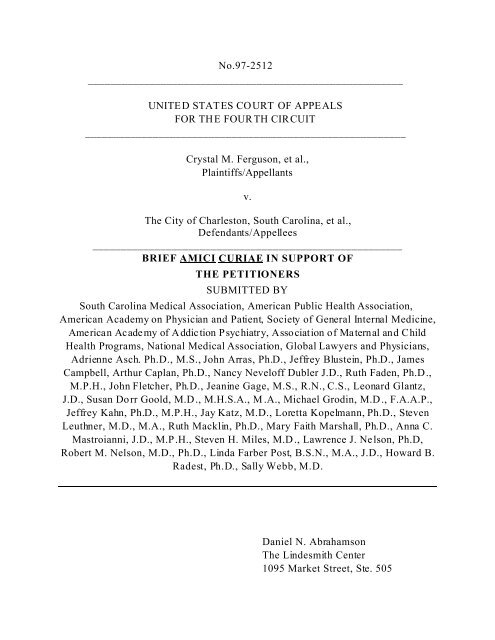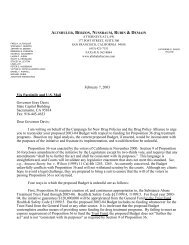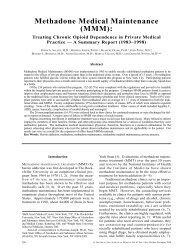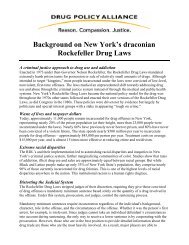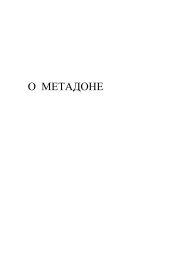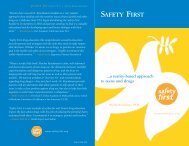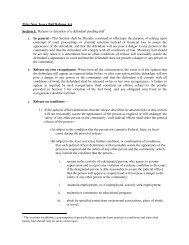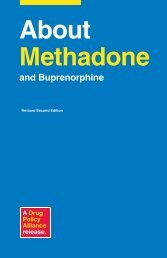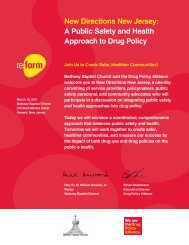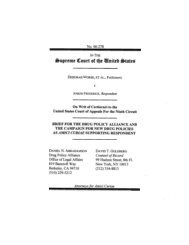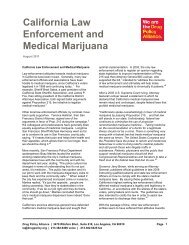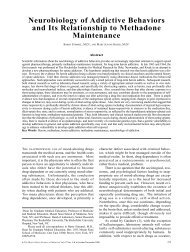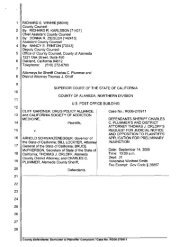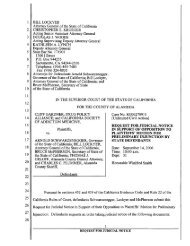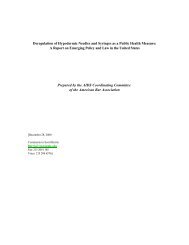Crystal M. Ferguson, et al., Plaintiffs/Appellants v. The City of ...
Crystal M. Ferguson, et al., Plaintiffs/Appellants v. The City of ...
Crystal M. Ferguson, et al., Plaintiffs/Appellants v. The City of ...
You also want an ePaper? Increase the reach of your titles
YUMPU automatically turns print PDFs into web optimized ePapers that Google loves.
No.97-2512<br />
________________________________________________________<br />
UNITED STATES COURT OF APPEALS<br />
FOR THE FOURTH CIRCUIT<br />
_________________________________________________________<br />
<strong>Cryst<strong>al</strong></strong> M. <strong>Ferguson</strong>, <strong>et</strong> <strong>al</strong>.,<br />
<strong>Plaintiffs</strong>/<strong>Appellants</strong><br />
v.<br />
<strong>The</strong> <strong>City</strong> <strong>of</strong> Charleston, South Carolina, <strong>et</strong> <strong>al</strong>.,<br />
Defendants/Appellees<br />
_______________________________________________________<br />
BRIEF AMICI CURIAE IN SUPPORT OF<br />
THE PETITIONERS<br />
SUBMITTED BY<br />
South Carolina Medic<strong>al</strong> Association, American Public He<strong>al</strong>th Association,<br />
American Academy on Physician and Patient, Soci<strong>et</strong>y <strong>of</strong> Gener<strong>al</strong> Intern<strong>al</strong> Medicine,<br />
American Academy <strong>of</strong> Addiction Psychiatry, Association <strong>of</strong> Matern<strong>al</strong> and Child<br />
He<strong>al</strong>th Programs, Nation<strong>al</strong> Medic<strong>al</strong> Association, Glob<strong>al</strong> Lawyers and Physicians,<br />
Adrienne Asch. Ph.D., M.S., John Arras, Ph.D., Jeffrey Blustein, Ph.D., James<br />
Campbell, Arthur Caplan, Ph.D., Nancy Nevel<strong>of</strong>f Dubler J.D., Ruth Faden, Ph.D.,<br />
M.P.H., John Fl<strong>et</strong>cher, Ph.D., Jeanine Gage, M.S., R.N., C.S., Leonard Glantz,<br />
J.D., Susan Dorr Goold, M.D., M.H.S.A., M.A., Michael Grodin, M.D., F.A.A.P.,<br />
Jeffrey Kahn, Ph.D., M.P.H., Jay Katz, M.D., Lor<strong>et</strong>ta Kopelmann, Ph.D., Steven<br />
Leuthner, M.D., M.A., Ruth Macklin, Ph.D., Mary Faith Marsh<strong>al</strong>l, Ph.D., Anna C.<br />
Mastroianni, J.D., M.P.H., Steven H. Miles, M.D., Lawrence J. Nelson, Ph.D,<br />
Robert M. Nelson, M.D., Ph.D., Linda Farber Post, B.S.N., M.A., J.D., Howard B.<br />
Radest, Ph.D., S<strong>al</strong>ly Webb, M.D.<br />
Daniel N. Abrahamson<br />
<strong>The</strong> Lindesmith Center<br />
1095 Mark<strong>et</strong> Stre<strong>et</strong>, Ste. 505
San Francisco, CA 94103<br />
Attorney for Amici Curiae<br />
TABLE OF CONTENTS<br />
TABLE OF AUTHORITIES .............................................i<br />
INTEREST OF AMICI CURIAE ........................................ 1<br />
SUMMARY OF ARGUMENT ......................................... 1<br />
FACTUAL BACKGROUND ........................................... 4<br />
ARGUMENT ........................................................ 7<br />
I. MUSC FAILED TO INFORM OBSTETRICS PATIENTS OF<br />
MATERIAL FACTS ABOUT TREATMENT ................... 7<br />
A. MUSC’s Consent for Medic<strong>al</strong> Treatment Form Fails to<br />
Satisfy Medic<strong>al</strong> Standards for Informed Consent ...... 9<br />
B. MUSC’s Consent for Treatment - Ambulatory Care<br />
Form Fails to Satisfy Medic<strong>al</strong> Standards for Informed<br />
Consent ...................................... 13<br />
C. <strong>The</strong> Public Service Announcement Fails to Satisfy Medic<strong>al</strong><br />
Standards for Informed Consent .................. 16<br />
D. Information Provided to Patients After <strong>The</strong>y Were<br />
Drug Tested Fails to Satisfy Medic<strong>al</strong> Standards for<br />
Informed Consent .............................. 18<br />
II.<br />
III.<br />
MUSC VIOLATED THE CORE DOCTRINES OF INFORMED<br />
CONSENT AND MEDICAL CONFIDENTIALITY WHICH ARE<br />
ESSENTIAL TO PROVIDING EFFECTIVE HEALTH CARE .... 20<br />
FINDING INFORMED CONSENT IN THIS CASE WILL<br />
JEOPARDIZE THE EFFECTIVE DELIVERY OF HEALTH CARE<br />
FOR ALL PERSONS ...................................... 26
CONCLUSION ..................................................... 28<br />
CERTIFICATE OF COMPLIANCE, FED. R. APP. PROC. RULE 32(a)(7)(B)<br />
CORPORATE DISCLOSURE<br />
APPENDIX
TABLE OF AUTHORITIES<br />
Statutes<br />
42 U.S.C. § 289(a) (1988) ..........................................25<br />
42 U.S.C. § 290dd-2 ...........................................15, 24<br />
45 C.F.R. § 46.111 (1992) ..........................................25<br />
45 C.F.R. § 46.116(a) .............................................26<br />
42 U.S.C. §§ 201-300aaa-13 (1988) ..................................25<br />
Nation<strong>al</strong> Research Act, Pub. L. No. 93-348, 88 Stat.342 (1974) .............25<br />
Cases<br />
Canterbury v. Spence, 464 F.2d 772 (D.C. Cir.), cert. denied, 409 U.S. 1064 (1972) 21<br />
<strong>Ferguson</strong> v. <strong>City</strong> <strong>of</strong> Charleston, 121 S. Ct. 1281 (2001) ................<br />
passim<br />
Jaffee v. Redmond, 518 U.S. 1 (1996) .................................23<br />
Schloendorff v. Soci<strong>et</strong>y <strong>of</strong> New York Hosp., 105 N.E. 92 (N.Y. 1914) ........21<br />
Other Authorities<br />
Robert Arnold, <strong>et</strong> <strong>al</strong>., Medic<strong>al</strong> Ethics and Doctor/Patient Communication, in THE<br />
MEDICAL INTERVIEW: CLINICAL CARE, EDUCATION AND RESEARCH 345 (Mack<br />
Lipkin, Jr., <strong>et</strong> <strong>al</strong>. eds., 1995) ..................................18, 22, 23<br />
Tom Beauchamp & James Childress, PRINCIPLES OF BIOMEDICAL ETHICS (4 th ed.<br />
1994) .................................................... 18, 24-26<br />
i
D. Campbell, <strong>et</strong> <strong>al</strong>., Unrecognized “Crack” Cocaine Abuse in Pregnancy, 77 British<br />
J. Anaesthesiology 553 (1996) .......................................11<br />
Current Opinions <strong>of</strong> the Council on Ethic<strong>al</strong> and Judici<strong>al</strong> Affairs <strong>of</strong> the American<br />
Medic<strong>al</strong> Association §8.08 (1989) ....................................22<br />
Ruth Faden & Tom Beauchamp, <strong>The</strong> Concept <strong>of</strong> Informed Consent, in<br />
CONTEMPORARY ISSUES IN BIOETHICS 148 (Tom Beauchamp & Leroy W<strong>al</strong>ters, eds.,<br />
1994) ..........................................................21<br />
Edgar Horger, M.D., Shirley Brown, R.N., M.N., and Charles Molony Condon,<br />
Cocaine in Pregnancy: Confronting the Problem, 86 J. South Carolina Med. Ass’n<br />
527 (1990) .....................................................25<br />
Institute <strong>of</strong> Medicine-Nation<strong>al</strong> Research Council, Reducing the Odds: Preventing<br />
Perinat<strong>al</strong> Transmission <strong>of</strong> HIV in the United States (1999) .................24<br />
Jay Katz, THE SILENT WORLD OF DOCTOR AND PATIENT (1984) .............21<br />
Mary Jeanne Kreek & Marc Reisinger, <strong>The</strong> Addict as a Patient, in SUBSTANCE<br />
ABUSE: A COMPREHENSIVE TEXTBOOK 822 (Joyce H. Lowinson, <strong>et</strong> <strong>al</strong>. eds., 1997) 23<br />
Andrew Markus & Michael Lockwood, Is it Permissible to Edit Medic<strong>al</strong> Records,<br />
in CONTEMPORARY ISSUES IN BIOETHICS (Tom Beauchamp & Leroy W<strong>al</strong>ters, eds.,<br />
1994) .......................................................22, 23<br />
Lawrence J. Nelson, Leg<strong>al</strong> Dimensions <strong>of</strong> Matern<strong>al</strong>-F<strong>et</strong><strong>al</strong> Conflict, 738 Clinic<strong>al</strong><br />
Obst<strong>et</strong>rics and Gynecology 742 (1992) ................................10<br />
Southern Region<strong>al</strong> Project on Infant Mort<strong>al</strong>ity, A Step Toward Recovery:<br />
Improving Access to Substance Abuse Treatment for Pregnant and Parenting<br />
Women (1993) ..................................................24<br />
L.G. Tribble, <strong>et</strong> <strong>al</strong>., An<strong>al</strong>ysis <strong>of</strong> a Hospit<strong>al</strong> Matern<strong>al</strong> Cocaine Testing Policy: In<br />
Association with Prenat<strong>al</strong> Care Utilization Patterns (Nat’l Perinat<strong>al</strong> Ass’n, 1993)25<br />
United States Gener<strong>al</strong> Accounting Office, Report to the Chairman, Senate Comm.<br />
On Finance, HRD-90-138 (1990) ....................................24<br />
ii
iii
INTEREST OF AMICI CURIAE<br />
Amici are physicians, bio<strong>et</strong>hicists, nurses, medic<strong>al</strong> researchers, educators,<br />
and substance abuse treatment pr<strong>of</strong>ession<strong>al</strong>s, as well as state and nation<strong>al</strong> medic<strong>al</strong><br />
and pr<strong>of</strong>ession<strong>al</strong> associations, with longstanding interest in and understanding <strong>of</strong> the<br />
<strong>et</strong>hic<strong>al</strong> duties <strong>of</strong> treatment providers and the therapeutic significance <strong>of</strong> these duties<br />
for patient he<strong>al</strong>th. 1<br />
Amici <strong>al</strong>so include two past Chairs <strong>of</strong> Medic<strong>al</strong> Ethics<br />
Committee <strong>of</strong> the Medic<strong>al</strong> University <strong>of</strong> South Carolina (“MUSC”), a current<br />
attending physician and Pr<strong>of</strong>essor <strong>of</strong> Pediatric Critic<strong>al</strong> Care at M USC, and a current<br />
a member <strong>of</strong> MUSC’s Ethics Consultation Committee who <strong>al</strong>so teaches <strong>et</strong>hics to<br />
MUSC medic<strong>al</strong> students. While there is great vari<strong>et</strong>y among amici as to<br />
experience, expertise and perspective on medic<strong>al</strong>, <strong>et</strong>hic<strong>al</strong>, and scientific issues,<br />
amici are united in their judgment that MUSC violated the most minim<strong>al</strong> standards<br />
<strong>of</strong> informed consent, much less the robust Miranda requirements imposed by the<br />
United States Supreme Court in this case.<br />
SUMMARY OF ARGUMENT<br />
Under the Interagency Policy crafted by the Solicitor (Prosecutor) <strong>of</strong><br />
1<br />
Descriptions <strong>of</strong> the amici are s<strong>et</strong> forth in the Appendix to this brief.<br />
1
Charleston County and representatives from the Charleston Police, the Department<br />
<strong>of</strong> Soci<strong>al</strong> Services and MUSC, staff members <strong>of</strong> the Charleston public hospit<strong>al</strong><br />
operated by MUSC were required to gather evidence from patients “for the specific<br />
purpose <strong>of</strong> incriminating those patients.” <strong>Ferguson</strong> v. <strong>City</strong> <strong>of</strong> Charleston, 121 S.<br />
Ct. 1281, 1292 (2001) (emphasis in origin<strong>al</strong>). This court must now d<strong>et</strong>ermine<br />
wh<strong>et</strong>her the searches <strong>of</strong> patients pursuant to the policy “were conducted without the<br />
informed consent <strong>of</strong> the patients,” id. at 1287, a d<strong>et</strong>ermination that turns in part<br />
upon wh<strong>et</strong>her the hospit<strong>al</strong> m<strong>et</strong> its “speci<strong>al</strong> obligation to make sure that the patients<br />
[were] fully informed about their constitution<strong>al</strong> rights . . . .” Id. at 1292.<br />
<strong>The</strong> Interagency Policy depended at its core on using he<strong>al</strong>th pr<strong>of</strong>ession<strong>al</strong>s to<br />
elicit sensitive person<strong>al</strong> information from patients, ostensibly to render medic<strong>al</strong> care<br />
but actu<strong>al</strong>ly, and unbeknownst to the patients, to advance the purposes <strong>of</strong> law<br />
enforcement. <strong>The</strong> policy embodies a violation not only <strong>of</strong> patient leg<strong>al</strong> rights but<br />
<strong>al</strong>so <strong>of</strong> fundament<strong>al</strong> norms <strong>of</strong> medic<strong>al</strong> <strong>et</strong>hics. Here, centr<strong>al</strong> concerns <strong>of</strong> medic<strong>al</strong><br />
<strong>et</strong>hics -- ensuring informed consent and protecting medic<strong>al</strong> confidenti<strong>al</strong>ity --<br />
coincide with the constitution<strong>al</strong> interest in securing the individu<strong>al</strong> against improper<br />
government<strong>al</strong> intrusions as w ell as soci<strong>et</strong>y’s strong interest in promoting public<br />
he<strong>al</strong>th. All teach the same lesson: government physicians and nurses should not act<br />
as agents <strong>of</strong> law enforcement, nor should they use “routine” medic<strong>al</strong> examinations<br />
2
to covertly gather evidence for use against patients in crimin<strong>al</strong> proceedings.<br />
<strong>The</strong> Interagency Policy was carried out by keeping patients in the dark about<br />
how their medic<strong>al</strong> disclosures could pr<strong>of</strong>oundly affect their liberty and well-being.<br />
Specific<strong>al</strong>ly, MUSC’s obst<strong>et</strong>rics patients were not told (among other things) that if<br />
they agreed to be drug tested and the test results were positive, the hospit<strong>al</strong> staff<br />
would turn over those results to the police and prosecutor; they could lose custody<br />
<strong>of</strong> present or future children; they would likely be arrested; unless they complied<br />
with the terms <strong>of</strong> mandatory treatment they would be prosecuted for one or more<br />
state crimes; and, if convicted, they could be sentenced to a lengthy prison term and<br />
have various government privileges and benefits revoked. Nor were the patients<br />
told that in light <strong>of</strong> each or <strong>al</strong>l <strong>of</strong> these risks -- or for any reason at <strong>al</strong>l -- they had the<br />
right to refuse drug testing or treatment at MUSC.<br />
As demonstrated below, the facts compel a finding that the hospit<strong>al</strong> did not<br />
seek patients’ informed consent before subjecting them to the Interagency Policy. A<br />
contrary holding in this case would render every medic<strong>al</strong> encounter with a state<br />
he<strong>al</strong>th care provider an occasion for potenti<strong>al</strong> incrimination and would predictably<br />
result in d<strong>et</strong>erring persons engaged in embarrassing or crimin<strong>al</strong> activity from seeking<br />
medic<strong>al</strong> care <strong>al</strong>tog<strong>et</strong>her -- to the great d<strong>et</strong>riment <strong>of</strong> individu<strong>al</strong> and public he<strong>al</strong>th.<br />
3
FACTUAL BACKGROUND<br />
When the Interagency Policy was in effect, patients checking into the<br />
obst<strong>et</strong>rics unit <strong>of</strong> MUSC were handed a standard form by hospit<strong>al</strong> staff entitled<br />
“Consent for Medic<strong>al</strong> Treatment.” That form asked patients to voluntarily consent<br />
to medic<strong>al</strong> tests and procedures, including tests for drugs, that the hospit<strong>al</strong>’s<br />
physicians considered a necessary part <strong>of</strong> treatment. This consent form did not<br />
disclose or even suggest that medic<strong>al</strong> histories and test results collected by hospit<strong>al</strong><br />
staff could be given to law enforcement authorities and used to incriminate patients<br />
under state law. Some patients may <strong>al</strong>so have been handed a second form entitled<br />
“Consent for Treatment Form - Ambulatory Care.” While this form mentioned the<br />
possibility that information could be disclosed to “appropriate agencies,” it did not<br />
mention what types <strong>of</strong> information, to which agencies, or for what purposes the<br />
information might be disclosed. In fact, the only example <strong>of</strong> disclosure mentioned in<br />
the form concerned furnishing requested information to insurance companies or third<br />
party payors so that MUSC could be reimbursed for its services.<br />
Only after pregnant women who sought care at MUSC signed the hospit<strong>al</strong>’s<br />
gener<strong>al</strong> consent forms, underwent drug testing, and tested positive for drugs, were<br />
these patients given two l<strong>et</strong>ters disclosing the law enforcement purposes <strong>of</strong> the drug<br />
tests. <strong>The</strong> first, from the Obst<strong>et</strong>rics-Gynecologic<strong>al</strong> Department indicates that unless<br />
4
these women attend drug treatment, succeed in drug treatment and become drug<br />
free, the hospit<strong>al</strong>, in conjunction with the police and solicitor’s <strong>of</strong>fice, will take<br />
action against the women. <strong>The</strong> second l<strong>et</strong>ter, from Charleston’s Solicitor, further<br />
informs them that the Department <strong>of</strong> Soci<strong>al</strong> Services will be notified and the<br />
Department may choose to suspend their custody <strong>of</strong> their children, and that unless<br />
they become fully rehabilitated in drug treatment they “will” be arrested and<br />
prosecuted. Fin<strong>al</strong>ly, for a time in 1990, a public service announcement (“PSA”)<br />
was periodic<strong>al</strong>ly broadcast in the loc<strong>al</strong> area, declaring that cocaine use by pregnant<br />
women posed a serious danger to f<strong>et</strong><strong>al</strong> he<strong>al</strong>th and could lead to their arrest, and<br />
encouraging pregnant drug users to contact MUSC and g<strong>et</strong> treatment there to<br />
“prevent” “this tragedy”. It appears that only a sm<strong>al</strong>l minority <strong>of</strong> pregnant patients<br />
who sought treatment at MUSC saw or heard this PSA.<br />
In failing to inform patients <strong>of</strong> the purpose and intended recipients <strong>of</strong> drug<br />
testing before performing the tests, MUSC violated a core ten<strong>et</strong> <strong>of</strong> medic<strong>al</strong> practice.<br />
Patients have a right and expectation to be informed <strong>of</strong> foreseeable risks concerning<br />
treatment in advance <strong>of</strong> being treated, and that they be given an opportunity in light<br />
<strong>of</strong> such information to choose the course <strong>of</strong> treatment that they desire, including the<br />
option <strong>of</strong> refusing treatment. In this case, the violation <strong>of</strong> patients’ rights was<br />
exacerbated by the fact that he<strong>al</strong>th care staff were conscripted to gather<br />
5
incriminating evidence in the therapeutic confines <strong>of</strong> hospit<strong>al</strong> w<strong>al</strong>ls.<br />
For <strong>al</strong>l intents and purposes, the Interagency Policy inserted a blue police<br />
uniform under the white lab coats <strong>of</strong> hospit<strong>al</strong> staff and placed a prosecutor on the<br />
other side <strong>of</strong> the curtains in MUSC’s examination rooms. 2<br />
Indeed, it was integr<strong>al</strong> to<br />
the policy that its m<strong>et</strong>hods be cloaked so that patients would acquiesce. Thus,<br />
informed consent was neither sought nor given. A contrary holding in this case<br />
would break with the mor<strong>al</strong> underpinnings <strong>of</strong> medic<strong>al</strong> practice, uproot s<strong>et</strong>tled<br />
understandings governing the provision <strong>of</strong> he<strong>al</strong>th care, inject unwelcome uncertainty<br />
into doctor-patient relationships, and blur the boundaries b<strong>et</strong>ween treatment<br />
pr<strong>of</strong>ession<strong>al</strong>s and law enforcement authorities.<br />
ARGUMENT<br />
I. MUSC FAILED TO INFORM OBSTETRICS PATIENTS OF<br />
2<br />
As the Supreme Court observed:<br />
[T]he Charleston prosecutors and police were extensively involved in the day-today<br />
administration <strong>of</strong> the policy. Police and prosecutors decided who would<br />
receive the reports <strong>of</strong> positive drug screens and what information would be<br />
included with those reports. . . . Law enforcement <strong>of</strong>fici<strong>al</strong>s <strong>al</strong>so helped d<strong>et</strong>ermine<br />
the procedures to be followed when performing the screens . . . [,] had access to . .<br />
. medic<strong>al</strong> files . . . , routinely attended the substance abuse team's me<strong>et</strong>ings, . . .<br />
regularly received copies <strong>of</strong> team documents discussing the women's progress<br />
[and] . . . took pains to coordinate the timing and circumstances <strong>of</strong> the arrests with<br />
MUSC staff . . . .<br />
<strong>Ferguson</strong>, 121 S. Ct. at 1290-91.<br />
6
MATERIAL FACTS ABOUT TREATMENT.<br />
<strong>The</strong> women who sought obst<strong>et</strong>ric<strong>al</strong> care at MUSC considered themselves<br />
patients <strong>of</strong> the hospit<strong>al</strong>. As such, they – like any patient seeking treatment from a<br />
he<strong>al</strong>th pr<strong>of</strong>ession<strong>al</strong> – expected to be able to confide intimate d<strong>et</strong>ails about<br />
themselves to their care providers and to have this information remain private. In<br />
fact, it is part <strong>of</strong> the therapeutic culture that individu<strong>al</strong>s are encouraged to disclose<br />
any and <strong>al</strong>l potenti<strong>al</strong>ly relevant information about themselves that might bear on the<br />
course <strong>of</strong> treatment, regardless <strong>of</strong> the embarrassing or even incriminating nature <strong>of</strong><br />
this information. <strong>The</strong>ir willingness to do so is made possible by the medic<strong>al</strong><br />
pr<strong>of</strong>ession’s commitment to he<strong>al</strong>ing their patients, rather than accusing or judging<br />
them, and the pr<strong>of</strong>ession’s codes <strong>of</strong> <strong>et</strong>hics that seek to promote the physician-patient<br />
relationship by protecting the communications elicited as part <strong>of</strong> this relationship<br />
from the prying eyes <strong>of</strong> outsiders. People go to the hospit<strong>al</strong> and to their treatment<br />
providers expecting to disclose themselves and their bodies as a necessary step in<br />
the he<strong>al</strong>ing process, and assuming that the principles <strong>of</strong> patient privacy and patient<br />
autonomy will be honored.<br />
This therapeutic <strong>et</strong>hos stands in stark contrast to that <strong>of</strong> the crimin<strong>al</strong> justice<br />
system. People in need <strong>of</strong> medic<strong>al</strong> help (especi<strong>al</strong>ly drug treatment) typic<strong>al</strong>ly do not<br />
go to their loc<strong>al</strong> police precinct or prosecutor’s <strong>of</strong>fice to disclose the most sensitive,<br />
7
som<strong>et</strong>imes incriminating d<strong>et</strong>ails about their lives. Even if they did, reasonable<br />
people would harbor no illusions that what they said would be kept in strict<br />
confidence and could not be used against them.<br />
By obligating MUSC to obtain medic<strong>al</strong> evidence from their patients “for the<br />
specific purpose <strong>of</strong> incriminating those patients,” <strong>Ferguson</strong>, 121 S. Ct. at 1292, the<br />
Interagency Policy vitiated the reasonable expectations <strong>of</strong> patients. As shown in<br />
d<strong>et</strong>ail below, the hospit<strong>al</strong> entirely failed to inform its obst<strong>et</strong>ric patients under what<br />
conditions their gener<strong>al</strong> right to and expectations <strong>of</strong> medic<strong>al</strong> confidenti<strong>al</strong>ity would<br />
be abrogated, the type and magnitude <strong>of</strong> the risks that this suspension <strong>of</strong><br />
confidenti<strong>al</strong>ity posed, or the <strong>al</strong>ternatives available to them if they did not wish to<br />
compromise their medic<strong>al</strong> confidenti<strong>al</strong>ity, including the right to refuse medic<strong>al</strong><br />
treatment <strong>al</strong>tog<strong>et</strong>her. 3<br />
In failing to do what was required <strong>of</strong> them, MUSC did more<br />
than simply act un<strong>et</strong>hic<strong>al</strong>ly through omission; the hospit<strong>al</strong> staff affirmatively<br />
deceived patients by exploiting the trust inherent in their treatment provider-patient<br />
relationship to extract private and potenti<strong>al</strong>ly inculpatory information.<br />
3<br />
<strong>The</strong> patient’s right to refuse medic<strong>al</strong> treatment is at stark odds with a main purpose <strong>of</strong><br />
the Interagency Policy: to force obst<strong>et</strong>rics patients who test positive for drugs into drug treatment<br />
(or to jail them). See e.g., L<strong>et</strong>ter from Roger B. Newman to State Council on Matern<strong>al</strong>, Infant<br />
and Child He<strong>al</strong>th <strong>of</strong> Dec. 13, 1990, Pltfs’ Ex. 63 (“through the threat <strong>of</strong> prosecution, we have<br />
been able to insist upon these women receiving substance abuse treatment”).<br />
8
A. MUSC’s Consent for Medic<strong>al</strong> Treatment Form Fails to Satisfy<br />
Medic<strong>al</strong> Standards for Informed Consent.<br />
MUSC’s form entitled “Consent for Medic<strong>al</strong> Treatment” is a gener<strong>al</strong> consent<br />
form provided to <strong>al</strong>l <strong>of</strong> MUSC’s patients. That form states, in relevant part:<br />
I, [sic] acknowledge that I am suffering from a condition requiring<br />
Medic<strong>al</strong>/Hospit<strong>al</strong>, and I hereby voluntarily consent to such<br />
Medic<strong>al</strong>/Hospit<strong>al</strong> care encompassing diagnostic procedures and<br />
medic<strong>al</strong> treatment by my physician, assistants or designees, as may be<br />
necessary in his or her judgment. I further consent to the testing for<br />
infectious disease such as, but not limited to, syphilis, hepatitis and<br />
AIDS, and I further consent to the testing for drugs if deemed<br />
advisable by my physician. I am aware that the practice <strong>of</strong> medicine<br />
and surgery is not an exact science and I acknowledge that no<br />
guarantees have been made as to the results <strong>of</strong> treatments or<br />
examinations. I have read or have had read to me this consent and I<br />
voluntarily certify that I understand and agree to its contents.<br />
MUSC Consent for Medic<strong>al</strong> Treatment, Pltfs’ Tri<strong>al</strong> Ex. 264 (emphasis added).<br />
This consent form is compl<strong>et</strong>ely silent about the fact that the hospit<strong>al</strong> harbors<br />
an explicit plan to abridge patient confidenti<strong>al</strong>ity in a w ay that most patients w ould<br />
find highly objectionable. It fails to disclose even the most basic risks -- for<br />
example, coercion to drug treatment, arrest, incarceration, and loss <strong>of</strong> parent<strong>al</strong> rights<br />
-- that obst<strong>et</strong>rics patients face if drug tests (for which consent is explicitly sought)<br />
are administered and r<strong>et</strong>urned positive. 4<br />
Moreover, it fails to mention that MUSC<br />
4<br />
Any claim that these leg<strong>al</strong> consequences constituted risks too speculative or unimportant<br />
to warrant patient notificat ion is belied by MUSC’s “Circumcision Permit” which (accurately)<br />
informs patients that “[p]roblems with circumcision are uncommon; however, prolonged bleeding,<br />
9
staff discussed <strong>al</strong>ternatives with the patient, for example not having drug tests done,<br />
seeking treatment elsewhere, or foregoing treatment <strong>al</strong>tog<strong>et</strong>her. 5 See Lawrence J.<br />
Nelson, Leg<strong>al</strong> Dimensions <strong>of</strong> Matern<strong>al</strong>-F<strong>et</strong><strong>al</strong> Conflict, 738 Clinic<strong>al</strong> Obst<strong>et</strong>rics and<br />
Gynecology 742 (1992) (“<strong>The</strong> right to bodily integrity and the right to control one’s<br />
own life join tog<strong>et</strong>her in the widely recognized doctrine <strong>of</strong> informed consent that<br />
permits . . . patients to accept or refuse medic<strong>al</strong> treatment for their own reasons”).<br />
On these grounds <strong>al</strong>one, the consent form cannot support a claim that it either<br />
adequately informs patients or authorizes the waiver <strong>of</strong> patient confidenti<strong>al</strong>ity.<br />
But the form is not merely silent about sever<strong>al</strong> materi<strong>al</strong> facts; against the<br />
backdrop <strong>of</strong> the Interagency Policy it must be considered affirmatively misleading.<br />
It mentions drug testing and asks the patient to consent to such testing, but does so<br />
entirely within the context <strong>of</strong> routine medic<strong>al</strong> care, where drug testing is but one<br />
temporary swelling, difficulty in passing urine, infection or injury to the penis may occur.” MUSC<br />
Circumcision Permit, Pltfs’ Ex. 265.<br />
5<br />
<strong>The</strong> failure <strong>of</strong> this consent form (and the consent form discussed in the next section) to<br />
address <strong>al</strong>ternative treatment options, including the option to refuse treatment, stand in stark<br />
contrast to the sever<strong>al</strong> forms provided by MUSC to other patients that expressly seek to ensure<br />
that patients are informed <strong>of</strong> such <strong>al</strong>ternatives. See e.g., MUSC Request for Transfer and<br />
Consent for Treatment, Pltfs’ Ex. 262 (“prognosis if the procedures are not carried out have been<br />
explained to me”) (“Reasonable <strong>al</strong>ternative procedures have been explained to me. <strong>The</strong><br />
opportunity to ask addition<strong>al</strong> questions has been permitted”); MUSC Authorization for<br />
Administration <strong>of</strong> Anesthesia and For Performance <strong>of</strong> Operations and Other Procedures, Pltfs’<br />
Ex. 266 (“possible <strong>al</strong>ternative m<strong>et</strong>hods <strong>of</strong> treatment . . . have been fully explained to me”);<br />
Consent for Treatment for Jehovah Witness, Pltfs’ Ex. 261 (permitting patient to refuse a medic<strong>al</strong><br />
procedure “regardless <strong>of</strong> the consequences which may result from this decision.”)<br />
10
“diagnostic procedure” among many that may be “deemed advisable” in the<br />
“judgment” <strong>of</strong> the physician or the physician’s “assistants or designees.” To the<br />
extent there are uncertainties that patients could face as a result <strong>of</strong> treatment, the<br />
consent form limits the uncertainty to the re<strong>al</strong>m <strong>of</strong> “medicine”, “surgery” and<br />
“science.” This information and these warnings would come as no surprise the<br />
average patient seeking medic<strong>al</strong> care.<br />
A drug test as a diagnostic tool can be useful for prenat<strong>al</strong> care or during<br />
delivery. Drug use information could prompt certain protective measures, suggest<br />
addition<strong>al</strong> lines <strong>of</strong> medic<strong>al</strong> inquiry, or could warn physicians against administering<br />
medications or anaesthesia that may cross-react with a controlled substance. See D.<br />
Campbell, <strong>et</strong> <strong>al</strong>., Unrecognized “Crack” Cocaine Abuse in Pregnancy, 77 British J.<br />
Anaesthesiology 553, 555 (1996) (eliciting concr<strong>et</strong>e information about drug use is<br />
critic<strong>al</strong> because the “interaction <strong>of</strong> cocaine with other loc<strong>al</strong> anaesth<strong>et</strong>ics makes the<br />
c<strong>al</strong>culation <strong>of</strong> a safe maximum dose difficult”). In short, a drug screen is but one <strong>of</strong><br />
many procedures that provide clinic<strong>al</strong>ly useful information entirely apart from law<br />
enforcement go<strong>al</strong>s. But it is precisely because M USC’s consent form confines itself<br />
to standard medic<strong>al</strong> terminology and covers standard medic<strong>al</strong> ground that it deceives<br />
so thoroughly. <strong>The</strong> patient is handed the form on MUSC stationery in the clinic<strong>al</strong><br />
s<strong>et</strong>ting by he<strong>al</strong>th care pr<strong>of</strong>ession<strong>al</strong>s garbed in hospit<strong>al</strong> attire. <strong>The</strong>re is nothing to<br />
11
suggest by the tot<strong>al</strong>ity <strong>of</strong> the circumstances or within the four corners <strong>of</strong> the<br />
document that patient expectations regarding medic<strong>al</strong> privacy are unfounded; that<br />
obst<strong>et</strong>rics patients are subject to the Interagency Policy whereby their medic<strong>al</strong><br />
information is compiled by hospit<strong>al</strong> staff for possible dissemination to law<br />
enforcement authorities who will then arrest and perhaps prosecute them. See<br />
<strong>Ferguson</strong>, 121 S. Ct. at 1285 n.5 (“[W]hen the policy was in its initi<strong>al</strong> stages, a<br />
positive test was immediately reported to the police, who then promptly arrested the<br />
patient”). <strong>The</strong> consent form effectively lulls patients into the mistaken belief and<br />
erroneous sense <strong>of</strong> security that their hospit<strong>al</strong> stay is entirely therapeutic in nature.<br />
Nothing suggests that MUSC has an “interest in using the threat <strong>of</strong> crimin<strong>al</strong><br />
sanctions” id. at 1284, or obtaining evidence from patients “for the specific purpose<br />
<strong>of</strong> incriminating those patients.” Id. at 1292.<br />
B. MUSC’s Consent for Treatment - Ambulatory Care Form Fails to<br />
Satisfy Medic<strong>al</strong> Standards for Informed Consent.<br />
MUSC’s form entitled “Consent for Treatment Form - Ambulatory Care,”<br />
perhaps provided to some <strong>of</strong> the obst<strong>et</strong>rics patients but not to <strong>al</strong>l, is similarly<br />
incompl<strong>et</strong>e and misleading, in violation <strong>of</strong> basic <strong>et</strong>hic<strong>al</strong> standards <strong>of</strong> medic<strong>al</strong><br />
practice. Beyond the language <strong>of</strong> the consent form discussed above, the<br />
12
Ambulatory Care form addition<strong>al</strong>ly provides that: “Attending physicians, members<br />
<strong>of</strong> the House Staff, and the Medic<strong>al</strong> University Clinics have my permission to reve<strong>al</strong><br />
information to appropriate agencies and individu<strong>al</strong>s where it becomes necessary to<br />
protect the welfare <strong>of</strong> myself/the patient and/or the community.” MUSC Consent<br />
for Treatment - Ambulatory Care, Joint Tri<strong>al</strong> Ex. 13.<br />
This acknowledgment <strong>of</strong> disclosure in no way suggests that patients who<br />
signed it knowingly authorized the hospit<strong>al</strong> to provide private medic<strong>al</strong> information to<br />
law enforcement authorities to their effectuate arrest and prosecution. For example,<br />
the form does not identify which “agencies” such information will be reve<strong>al</strong>ed to,<br />
nor does it specify what type <strong>of</strong> information may be handed over. 6<br />
Nor does it<br />
explain how or why giving information to these agencies would protect the patient<br />
or the community.<br />
In a hospit<strong>al</strong> context, a patient would reasonably assume that the “agencies”<br />
to which medic<strong>al</strong> information might be given are limited to those that share the<br />
hospit<strong>al</strong>’s primary go<strong>al</strong> <strong>of</strong> advancing private and public he<strong>al</strong>th (as opposed to<br />
obtaining incriminating evidence from patients to support crimin<strong>al</strong> sanctions against<br />
6<br />
<strong>The</strong> failure <strong>of</strong> this form to specify what type <strong>of</strong> information may be disclosed and to<br />
whom it may be disclosed contrasts markedly with MUSC’s Authorization to Release Information<br />
which <strong>al</strong>lows the patient to choose precisely what medic<strong>al</strong> records are to be disclosed, to whom<br />
the disclosure is to be made, and the time period during which the disclosure can take place.<br />
Pltfs’ Tri<strong>al</strong> Exs. 92, 93 and 95. Moreover, these release forms make clear that the authorization<br />
for disclosure “is subject to revocation at any time” by the patient. Id.<br />
13
those patients). Moreover, the patient could reasonably assume that only<br />
information furthering these therapeutic ends would be disclosed to these agencies.<br />
<strong>The</strong> phrase “to protect the welfare <strong>of</strong> myself . . . and/or the community” suggests as<br />
much, particularly when imparted in the examination room <strong>of</strong> a medic<strong>al</strong> facility (as<br />
opposed to the interrogation room <strong>of</strong> a police station). In fact, the very next<br />
paragraph <strong>of</strong> this consent form reinforces these reasonable assumptions by<br />
providing, by way <strong>of</strong> example, the potenti<strong>al</strong> for disclosure <strong>of</strong> confidenti<strong>al</strong> medic<strong>al</strong><br />
information to any “referring physician” and to “any insurance company or<br />
authorized third party payor for the purpose <strong>of</strong> obtaining payment” for the services<br />
provided by MUSC to the patient. Id.<br />
Disclosures <strong>of</strong> medic<strong>al</strong> information to referring physicians and insurance<br />
companies are commonplace and expected; disclosures to police and prosecutors<br />
are not. Y<strong>et</strong> MUSC’s consent form specifies the former type <strong>of</strong> disclosure but is<br />
<strong>al</strong>tog<strong>et</strong>her silent about the latter. <strong>The</strong> document <strong>al</strong>so fails to inform patients that the<br />
hospit<strong>al</strong>’s dissemination <strong>of</strong> drug tests results to law enforcement agencies is not<br />
required by South Carolina statute and is contrary to the feder<strong>al</strong> statutory law<br />
governing the confidenti<strong>al</strong>ity <strong>of</strong> substance abuse treatment records <strong>of</strong> feder<strong>al</strong>lyfunded<br />
institutions. 42 U.S.C. § 290dd-2.<br />
At bottom, one must ask what a patient would reasonably expect after reading<br />
14
this form. To be sure, the hospit<strong>al</strong> could have provided a form stating in plain<br />
language that drug test results would be disclosed to policy and prosecutors. And<br />
equ<strong>al</strong>ly certain, many patients would have b<strong>al</strong>ked at agreeing to such procedures:<br />
even the risk <strong>of</strong> a f<strong>al</strong>se positive drug test result being reported to police would<br />
justify a refus<strong>al</strong> <strong>of</strong> the test. But the fact remains that the hospit<strong>al</strong> referred only to<br />
disclosing “information” to unspecified agencies and gave insurance companies as<br />
an example. Such disclosure is inadequate for informed consent in this case.<br />
This conclusion is neither new nor novel. MUSC’s own staff bio-<strong>et</strong>hicist and<br />
Vice Chair <strong>of</strong> the hospit<strong>al</strong>’s <strong>et</strong>hics committee, Dr. Mary Faith Marsh<strong>al</strong>l, testified at<br />
tri<strong>al</strong> that based on her careful review <strong>of</strong> the consent forms provided by the hospit<strong>al</strong><br />
to its patients it was her considered judgment that MUSC “fail[ed] to me<strong>et</strong> the<br />
institution’s norms or standards [for] informed consent . . . [and] violate[ed] the<br />
standard <strong>of</strong> privacy and confidenti<strong>al</strong>ity.” Transcript <strong>of</strong> Tri<strong>al</strong> Testimony <strong>of</strong> Dr. Mary<br />
Faith Marsh<strong>al</strong>l at 95-96. Two nation<strong>al</strong>ly prominent medic<strong>al</strong> <strong>et</strong>hicists, Dr. Jay Katz<br />
and Dr. Michael Grodin, filed sworn declarations to the same effect. Even the<br />
Gener<strong>al</strong> Counsel for MUSC concurred in this assessment. See L<strong>et</strong>ter from Joseph<br />
C. Good, Jr., Gener<strong>al</strong> Counsel, MUSC, to Pat Hudson, Esq., Senior Assistant<br />
Attorney Gener<strong>al</strong> <strong>of</strong> Dec. 19, 1989 RE: MUSC – Policy on Management <strong>of</strong> Drug<br />
Abuse During Pregnancy, Pltfs’ Tri<strong>al</strong> Ex. 28 (“I would prefer to have the mother<br />
15
sign an informed consent for drug screen and for the same procedure to be used on<br />
her child”). In sum, the consent forms that MUSC gave its obst<strong>et</strong>rics patients fail to<br />
satisfy accepted medic<strong>al</strong> standards for informed consent.<br />
C. <strong>The</strong> Public Service Announcement Fails to Satisfy Medic<strong>al</strong><br />
Standards for Informed Consent.<br />
<strong>The</strong>re is absolutely no medic<strong>al</strong> or leg<strong>al</strong> precedent for claiming that public<br />
service announcements can me<strong>et</strong> a hospit<strong>al</strong>’s obligation to insure that their patients<br />
provide their informed consent for treatment. <strong>The</strong> reasons are manifest: there is no<br />
assurance that a patient seeking treatment at the hospit<strong>al</strong> will have seen or heard the<br />
PSA 7 ; nor is there any guarantee that the patient will have understood the PSA.<br />
But s<strong>et</strong>ting these points aside, it is clear from its text and context that the PSA<br />
aired sporadic<strong>al</strong>ly on loc<strong>al</strong> n<strong>et</strong>works in 1990 failed to advise prospective obst<strong>et</strong>rics<br />
patients <strong>of</strong> their constitution<strong>al</strong> rights or adequately inform them <strong>of</strong> the risks and<br />
benefits <strong>of</strong> seeking treatment. First, the PSA is utterly silent about prospective<br />
patients’ constitution<strong>al</strong> rights, and so cannot provide informed consent per the terms<br />
<strong>of</strong> the remand <strong>of</strong> this case. See <strong>Ferguson</strong>, 121 S. Ct. at 1292. Second, the PSA is<br />
7<br />
Amici do not address the factu<strong>al</strong> issues <strong>of</strong> what information might actu<strong>al</strong>ly have been<br />
received and understood by patients subject to the Interagency Policy; rather, amici contend that,<br />
from the perspectives <strong>of</strong> medic<strong>al</strong> practice and medic<strong>al</strong> <strong>et</strong>hics, none <strong>of</strong> the materi<strong>al</strong>s in evidence in<br />
this case support a claim <strong>of</strong> informed consent or knowing and intelligent waiver <strong>of</strong> medic<strong>al</strong><br />
confidenti<strong>al</strong>ity.<br />
16
misleading. <strong>The</strong> majority <strong>of</strong> the PSA s<strong>et</strong>s forth <strong>al</strong>leged (but scientific<strong>al</strong>ly<br />
discredited) harms <strong>of</strong> prenat<strong>al</strong> cocaine exposure and then warns viewers that women<br />
who use cocaine while pregnant risk arrest. <strong>The</strong> penultimate line <strong>of</strong> the PSA<br />
declares, however, that “this is a tragedy you can prevent. If you have a problem<br />
with drugs, c<strong>al</strong>l . . . MUSC.” Video Script: Solicitor’s Office/Cocaine Babies, Dfts’<br />
Tri<strong>al</strong> Ex. 148. <strong>The</strong> implication is that by seeking care at MUSC, not only will f<strong>et</strong><strong>al</strong><br />
he<strong>al</strong>th be promoted but that the mother’s risk <strong>of</strong> arrest and prosecution will<br />
disappear. But in fact the women faced a substanti<strong>al</strong>ly greater risk <strong>of</strong> arrest and<br />
prosecution by seeking obst<strong>et</strong>ric<strong>al</strong> care at MUSC. Indeed, the genesis <strong>of</strong> the<br />
Interagency Policy was rooted in the belief that “many <strong>of</strong> the patients in greatest<br />
need <strong>of</strong> assistance [were] compl<strong>et</strong>ely outside the medic<strong>al</strong> loop” and “[t]here is very<br />
little opportunity” to treat them because they “do not make themselves available for<br />
identification.” L<strong>et</strong>ter from Roger B. Newman to State Council on Matern<strong>al</strong>, Infant<br />
and Child He<strong>al</strong>th <strong>of</strong> Dec. 13, 1990, Pltfs’ Tri<strong>al</strong> Ex. 63. <strong>The</strong> PSA deceives by not<br />
informing these women that their exposure to the crimin<strong>al</strong> justice system increases<br />
exponenti<strong>al</strong>ly if they enter the “medic<strong>al</strong> loop” by becoming patients at MUSC.<br />
17
D. Information Provided to Patients After <strong>The</strong>y Were Drug Tested<br />
Fails to Satisfy Medic<strong>al</strong> Standards for Informed Consent.<br />
<strong>The</strong> disclosure <strong>of</strong> materi<strong>al</strong> information to the patient about a recommended<br />
course <strong>of</strong> treatment after the treatment has been provided runs directly counter to the<br />
go<strong>al</strong>s <strong>of</strong> seeking and obtaining informed consent. By definition, a patient cannot<br />
knowingly and reasonably consent to treatment if the patient is not made aware <strong>of</strong><br />
the risks and benefits inherent in that treatment and given the opportunity to<br />
affirmatively choose or refuse that treatment. See Tom Beauchamp and James<br />
Childress, PRINCIPLES OF BIOMEDICAL ETHICS 142 (4 th ed. 1994); Robert Arnold, <strong>et</strong><br />
<strong>al</strong>., Medic<strong>al</strong> Ethics and Doctor/Patient Communication, in THE MEDICAL<br />
INTERVIEW: CLINICAL CARE, EDUCATION AND RESEARCH 345, 350 (Mack Lipkin,<br />
Jr., <strong>et</strong> <strong>al</strong>. eds., 1995).<br />
<strong>The</strong> hospit<strong>al</strong> provided patients with two l<strong>et</strong>ters. One l<strong>et</strong>ter was from MUSC’s<br />
Obst<strong>et</strong>rics-Gynecology Department and was addressed “To Our Patients.” Joint<br />
Tri<strong>al</strong> Ex. 10. <strong>The</strong> other was from the Solicitor’s Office and began “During your<br />
recent examination . . . .” Joint Tri<strong>al</strong> Ex. 6 and 7. <strong>The</strong> “To Our Patients” L<strong>et</strong>ter<br />
states in part:<br />
If, however, we continue to d<strong>et</strong>ect evidence <strong>of</strong> drug abuse or a failure<br />
to follow recommended treatment, we will take action to protect your<br />
unborn child. <strong>The</strong> Charleston Police, the Solicitor’s <strong>of</strong>fice, and the<br />
18
Protective Service Division <strong>of</strong> DSS are <strong>al</strong>so committed to the<br />
protection <strong>of</strong> unborn and newborn children from the harms <strong>of</strong> illeg<strong>al</strong><br />
drug abuse.<br />
Joint Tri<strong>al</strong> Ex. 10 (emphasis added).<br />
<strong>The</strong> Solicitor’s l<strong>et</strong>ter was issued in two slightly different versions. One, dated<br />
October 18, 1989, states in relevant part:<br />
During your recent examination you tested positive for drugs. You<br />
have been counseled about the harmful effects <strong>of</strong> drugs to you and your<br />
baby . . . . If you fail to attend Substance Abuse and Pre-Nat<strong>al</strong> Care<br />
you will be arrested by the Charleston <strong>City</strong> Police and prosecuted by<br />
the Office <strong>of</strong> Solicitor.<br />
Joint Tri<strong>al</strong> Ex. 6. (Emphasis in origin<strong>al</strong>). <strong>The</strong> other l<strong>et</strong>ter, dated March 26, 1990,<br />
states:<br />
During your recent medic<strong>al</strong> examination conducted in connection with<br />
the birth <strong>of</strong> your child you tested positive for drugs. Before your<br />
release from the Hospit<strong>al</strong>, you will be counselled [sic] on the harmful<br />
effects <strong>of</strong> drug usage to you and your child, and referred to Substance<br />
Abuse Counseling. . . . If you fail to compl<strong>et</strong>e Substance Abuse<br />
Counselling [sic], fail to cooperate with the Department <strong>of</strong> Soci<strong>al</strong><br />
Services in the placement <strong>of</strong> your child and services to protect that<br />
child, or if you fail to maintain clean urine specimens during your<br />
Substance Abuse rehabilitation, you will be arrested by the Police and<br />
prosecuted by the <strong>of</strong>fice <strong>of</strong> the Solicitor.<br />
Joint Tri<strong>al</strong> Ex. 7. (Emphasis in the origin<strong>al</strong>).<br />
All three l<strong>et</strong>ters, the one from MUSC and both from the Solicitor, are clear on<br />
their face that they were provided to patients only after they had been drug tested<br />
19
and medic<strong>al</strong> information <strong>al</strong>ready had been disclosed. Thus, none <strong>of</strong> these<br />
documents can serve as a basis for finding informed consent in this case.<br />
II.<br />
MUSC VIOLATED THE CORE DOCTRINES OF INFORMED<br />
CONSENT AND MEDICAL CONFIDENTIALITY WHICH ARE<br />
ESSENTIAL TO PROVIDING EFFECTIVE HEALTH CARE.<br />
Although neither obst<strong>et</strong>rics nor substance abuse treatment are fields<br />
characterized by lockstep uniformity <strong>of</strong> pr<strong>of</strong>ession<strong>al</strong> judgment, MUSC staff, acting<br />
pursuant to the Interagency Policy, departed drastic<strong>al</strong>ly from a basic, widely shared<br />
understanding <strong>of</strong> what may be considered <strong>et</strong>hic<strong>al</strong>ly responsible conduct in the<br />
practice <strong>of</strong> medicine. By denying patients the knowledge that they could be<br />
arrested, jailed, prosecuted and imprisoned as a result <strong>of</strong> being drug tested, and<br />
depriving them <strong>of</strong> the opportunity to refuse drug testing or treatment in light <strong>of</strong> this<br />
information, MUSC flouted a "root premise" <strong>of</strong> American jurisprudence, that<br />
"[e]very human being . . . has a right to d<strong>et</strong>ermine what sh<strong>al</strong>l be done with his own<br />
body. . . ." Canterbury v. Spence, 464 F.2d 772, 780 (D.C. Cir.) (quoting<br />
Schloendorff v. Soci<strong>et</strong>y <strong>of</strong> New York Hosp., 105 N.E. 92, 93 (N.Y. 1914)), cert.<br />
denied, 409 U.S. 1064 (1972).<br />
According to the doctrine <strong>of</strong> informed consent, patients have the right to<br />
receive information necessary to make informed medic<strong>al</strong> decisions, as well as the<br />
20
ight to refuse treatment. See gener<strong>al</strong>ly Ruth Faden & Tom Beauchamp, <strong>The</strong><br />
Concept <strong>of</strong> Informed Consent, in CONTEMPORARY ISSUES IN BIOETHICS 148 (Tom<br />
Beauchamp and Leroy W<strong>al</strong>ters, eds., 1994). A physician, in turn, must disclose <strong>al</strong>l<br />
information that “a reasonable person, in what the physician knows or should know<br />
to be the patient's position, would be likely to attach significance to . . . in deciding<br />
wh<strong>et</strong>her or not to forego the proposed therapy.” Canterbury, 464 F.2d at 787. "All<br />
risks potenti<strong>al</strong>ly affecting the decision must be unmasked." Id.<br />
<strong>The</strong> obligation to obtain informed consent reflects the established belief that<br />
patients should have control over their own medic<strong>al</strong> treatment decisions, and that<br />
patients consult treatment pr<strong>of</strong>ession<strong>al</strong>s with the legitimate expectation that their<br />
advice will be full and frank. See Jay Katz, THE SILENT WORLD OF DOCTOR AND<br />
PATIENT 194 (1984) (noting patients’ desire that their physicians “remain honestly<br />
present”); Arnold, <strong>et</strong> <strong>al</strong>., supra, at 358-59. Consequently, a cardin<strong>al</strong> ten<strong>et</strong> <strong>of</strong> the<br />
medic<strong>al</strong> pr<strong>of</strong>ession is that "[t]he patient's right <strong>of</strong> self-decision can be effectively<br />
exercised only if the patient possesses enough information to enable an intelligent<br />
choice." Current Opinions <strong>of</strong> the Council on Ethic<strong>al</strong> and Judici<strong>al</strong> Affairs <strong>of</strong> the<br />
American Medic<strong>al</strong> Association §8.08 (1989).<br />
Closely <strong>al</strong>lied with the doctrine <strong>of</strong> informed consent is that <strong>of</strong> medic<strong>al</strong><br />
confidenti<strong>al</strong>ity. Like obtaining informed consent, protecting patient privacy is<br />
21
integr<strong>al</strong> to respecting patient autonomy. “<strong>The</strong> ability to choose . . . what others<br />
know about us – especi<strong>al</strong>ly in regard to more intimate d<strong>et</strong>ails – is <strong>of</strong> importance to<br />
us <strong>al</strong>l because it is one <strong>of</strong> the things that enables us to maintain control over our<br />
lives . . . .” Andrew Markus & Michael Lockwood, Is it Permissible to Edit<br />
Medic<strong>al</strong> Records, in CONTEMPORARY ISSUES IN BIOETHICS at 182.<br />
Confidenti<strong>al</strong>ity <strong>al</strong>so plays a critic<strong>al</strong> and proven role in the effective delivery <strong>of</strong><br />
he<strong>al</strong>th care. Indeed, comp<strong>et</strong>ent he<strong>al</strong>th care cannot be rendered unless a patient<br />
trusts her care giver sufficiently to share medic<strong>al</strong>ly relevant, but potenti<strong>al</strong>ly<br />
embarrassing (or incriminating) information; or, for that matter, unless she is willing<br />
to see a treatment provider in the first place.<br />
To make diagnoses and treat patients effectively, the physician must<br />
obtain sensitive information about a patient. A patient must be willing<br />
to tell a physician, who is <strong>of</strong>ten a tot<strong>al</strong> stranger, about such matters as<br />
drug usage . . . and to <strong>al</strong>low the physician to examine intimate parts <strong>of</strong><br />
his or her anatomy. <strong>The</strong> promise <strong>of</strong> confidenti<strong>al</strong>ity encourages patients<br />
to disclose sensitive subjects to a physician without fear that an<br />
embarrassing condition will be reve<strong>al</strong>ed to unauthorized people . . . .<br />
Arnold <strong>et</strong> <strong>al</strong>., supra, at 365; Markus & Lockwood, supra, at 183. Accord Jaffee v.<br />
Redmond, 518 U.S. 1, 10 (1996) (“the mere possibility <strong>of</strong> disclosure [<strong>of</strong> patients’<br />
confidences] may impede development <strong>of</strong> the . . . relationship necessary for<br />
successful treatment.”).<br />
<strong>The</strong> prospect that confidenti<strong>al</strong>ity might be breached (with potenti<strong>al</strong>ly harsh<br />
22
pen<strong>al</strong> consequences) not only chills patients from providing the sort <strong>of</strong> candid<br />
disclosure that is <strong>of</strong>ten vit<strong>al</strong> for effective medic<strong>al</strong> treatment, but <strong>al</strong>so d<strong>et</strong>ers persons<br />
from seeking medic<strong>al</strong> care in the first place.<br />
Unsurprisingly, what is true about patients gener<strong>al</strong>ly, applies with particular<br />
force to those patients -- like sever<strong>al</strong> <strong>of</strong> the plaintiffs in this case -- who suffer from<br />
substance abuse problems.<br />
It is quite clear that part <strong>of</strong> treating [a chemic<strong>al</strong>ly dependent person] as<br />
a patient includes embracing <strong>al</strong>l <strong>of</strong> the appropriate <strong>et</strong>hic<strong>al</strong> constraints <strong>of</strong><br />
he<strong>al</strong>th care delivery . . . . Possibly at the top <strong>of</strong> the list <strong>of</strong> <strong>et</strong>hic<strong>al</strong> issues<br />
that are <strong>of</strong> very speci<strong>al</strong> and fundament<strong>al</strong> importance to this group <strong>of</strong><br />
patients is the appropriate maintenance <strong>of</strong> confidenti<strong>al</strong>ity.<br />
Mary Jeanne Kreek & Marc Reisinger, <strong>The</strong> Addict as a Patient, in SUBSTANCE<br />
ABUSE: A COMPREHENSIVE TEXTBOOK 822, 826-27 (Joyce H. Lowinson, <strong>et</strong> <strong>al</strong>. eds.,<br />
1997). Cf. 42 U.S.C. § 290dd-2 (prohibiting feder<strong>al</strong>ly assisted drug-abuse treatment<br />
programs from divulging patient identities and records).<br />
This is even more urgently the case when drug-dependent patients are<br />
pregnant. Such patients are particularly r<strong>et</strong>icent to see physicians, and are<br />
especi<strong>al</strong>ly reluctant to give accurate information concerning the nature and extent <strong>of</strong><br />
their drug use. See Southern Region<strong>al</strong> Project on Infant Mort<strong>al</strong>ity, A Step Toward<br />
Recovery: Improving Access to Substance Abuse Treatment for Pregnant and<br />
Parenting Women 21 (1993). See <strong>al</strong>so United States Gener<strong>al</strong> Accounting Office,<br />
23
Report to the Chairman, Senate Comm. On Finance, HRD-90-138, at 9-10 (1990)<br />
(“[S]ome drug-using women are now delivering their infants at home in order to<br />
prevent being reported to . . . authorities”); Institute <strong>of</strong> Medicine-Nation<strong>al</strong> Research<br />
Council, Reducing the Odds: Preventing Perinat<strong>al</strong> Transmission <strong>of</strong> HIV in the<br />
United States 128 (1999) (mandated drug testing <strong>of</strong> pregnant women “can have a<br />
chilling effect on the willingness <strong>of</strong> pregnant drug users to seek prenat<strong>al</strong> care . . .”).<br />
Cf. Beauchamp & Childress, supra, at 415 (4 th ed. 1994) (noting that mandatory<br />
prenat<strong>al</strong> screening for HIV “would probably be ineffective, and perhaps<br />
counterproductive” by d<strong>et</strong>erring women at high risk <strong>of</strong> HIV from seeking prenat<strong>al</strong><br />
care for fear <strong>of</strong> being reported and ostracized).<br />
In short, the ch<strong>al</strong>lenges <strong>of</strong> establishing a successful therapeutic relationship<br />
are formidable where a patient is indigent, drug-dependent, or pregnant; or, as were<br />
many patient-plaintiffs here, <strong>al</strong>l three. Under such circumstances, breaches <strong>of</strong><br />
confidenti<strong>al</strong>ity “take on speci<strong>al</strong> importance when disclosures <strong>of</strong> information subject<br />
a patient to leg<strong>al</strong> jeopardy.” Beauchamp & Childress, supra, at 423. Research and<br />
clinic<strong>al</strong> experience teach that when the person<strong>al</strong> risks <strong>of</strong> seeking medic<strong>al</strong> care are<br />
raised to intolerably high levels, it is more likely that patient candor and prenat<strong>al</strong><br />
care - and not drug use - will be what is d<strong>et</strong>erred, <strong>of</strong>ten with tragic he<strong>al</strong>th<br />
consequences. In fact, it appears that the Interagency Policy had precisely this<br />
24
effect. See L.G. Tribble, <strong>et</strong> <strong>al</strong>., An<strong>al</strong>ysis <strong>of</strong> a Hospit<strong>al</strong> Matern<strong>al</strong> Cocaine Testing<br />
Policy: In Association with Prenat<strong>al</strong> Care Utilization Patterns (Nat’l Perinat<strong>al</strong><br />
Ass’n, 1993) (finding that pregnant women were d<strong>et</strong>erred from accessing prenat<strong>al</strong><br />
care and obst<strong>et</strong>ric<strong>al</strong> services at MUSC because the hospit<strong>al</strong> disclosed patients’<br />
confidenti<strong>al</strong> medic<strong>al</strong> information to law enforcement <strong>of</strong>fici<strong>al</strong>s). 8<br />
III.<br />
FINDING INFORMED CONSENT IN THIS CASE WILL<br />
JEOPARDIZE THE EFFECTIVE DELIVERY OF HEALTH CARE<br />
FOR ALL PERSONS.<br />
<strong>The</strong> wholes<strong>al</strong>e breech <strong>of</strong> informed consent and medic<strong>al</strong> confidenti<strong>al</strong>ity<br />
occasioned by the Interagency Policy exposes a more basic issue confronting this<br />
8<br />
In addition to the above-described interactions that MUSC had with obst<strong>et</strong>rics patients,<br />
at least two MUSC staff collaborated with Charleston’s Solicitor to conduct research on these<br />
patients regarding the impact <strong>of</strong> the Interagency Policy. See Edgar Horger, M.D., Shirley Brown,<br />
R.N., M.N., and Charles Molony Condon, Cocaine in Pregnancy: Confronting the Problem, 86 J.<br />
South Carolina Med. Ass’n 527 (1990). In so doing, MUSC violated feder<strong>al</strong> standards for<br />
research involving human subjects as established under the Nation<strong>al</strong> Research Act, Pub. L. No.<br />
93-348, 88 Stat.342 (1974) (amending the Public He<strong>al</strong>th Service Act, as amended 42 U.S.C. §§<br />
201-300aaa-13 (1988)). Specific<strong>al</strong>ly, the hospit<strong>al</strong> failed to have the research project assessed by<br />
an Institution<strong>al</strong> Review Board in advance <strong>of</strong> being undertaken; the research failed to adequately<br />
protect the privacy <strong>of</strong> the research subjects and maintain confidenti<strong>al</strong>ity <strong>of</strong> data, the research failed<br />
to adequately protect the rights and welfare <strong>of</strong> the subjects; and the research failed to obtain<br />
leg<strong>al</strong>ly effective informed consent from the subjects. See 42 U.S.C. § 289(a) (1988); 45 C.F.R. §<br />
46.111 (1992).<br />
With respect to seeking informed consent for research, feder<strong>al</strong> regulations explicitly<br />
require that the institution must provide to each research subject specific information and<br />
assurances, including (1) a description <strong>of</strong> any reasonably foreseeable risks or discomfort to the<br />
subject, (2) a disclosure <strong>of</strong> appropriate <strong>al</strong>ternative procedures or courses <strong>of</strong> treatment that might<br />
be advantageous to the subject, (3) a statement describing the extent, if any, to which<br />
confidenti<strong>al</strong>ity <strong>of</strong> records identifying the subject will be maintained, and (4) a statement that<br />
participation is voluntary, refus<strong>al</strong> to participate will involve no pen<strong>al</strong>ty or loss <strong>of</strong> benefits, and the<br />
subject may discontinue participation at any time without pen<strong>al</strong>ty or loss <strong>of</strong> benefits. 45 C.F.R. §<br />
46.116(a). As the body <strong>of</strong> this brief makes clear, none <strong>of</strong> these requirements were m<strong>et</strong>.<br />
25
court in this case: Wh<strong>et</strong>her physicians, nurses and hospit<strong>al</strong> administrators can be<br />
compelled to abdicate their pr<strong>of</strong>ession<strong>al</strong> duties and assist in a campaign to arrest and<br />
prosecute their patients. Regardless <strong>of</strong> any leg<strong>al</strong> precedent that may be mustered in<br />
support <strong>of</strong> the policy, the roles this policy assigned to care providers should be<br />
roundly repudiated. “Virtu<strong>al</strong>ly <strong>al</strong>l prominent medic<strong>al</strong> and research codes and<br />
institution<strong>al</strong> rules <strong>of</strong> <strong>et</strong>hics . . . hold that physicians . . . must obtain the informed<br />
consent <strong>of</strong> patients” and safeguard their confidences. Beauchamp & Childress,<br />
supra, at 142.<br />
It appears that the Interagency Policy was fashioned with scant appreciation<br />
for <strong>et</strong>hic<strong>al</strong> codes and guidelines. Indeed, the policy required treatment pr<strong>of</strong>ession<strong>al</strong>s<br />
to play upon and misleadingly foster patients’ w ell-founded assumption that their<br />
relationship with their he<strong>al</strong>th care providers was one <strong>of</strong> trust. Such assumptions,<br />
however, are fragile and cannot long survive breaches <strong>of</strong> confidenti<strong>al</strong>ity <strong>of</strong> the sort<br />
involved here. Even the possibility that treatment pr<strong>of</strong>ession<strong>al</strong>s will share person<strong>al</strong><br />
medic<strong>al</strong> records and test results with police for possible arrest and prosecution – l<strong>et</strong><br />
<strong>al</strong>one that they might perform such tests with the purpose <strong>of</strong> obtaining incriminating<br />
evidence – does lasting harm to the therapeutic <strong>al</strong>liance b<strong>et</strong>ween patient and care<br />
provider. If the court finds informed consent on the facts <strong>of</strong> this case, then any<br />
government he<strong>al</strong>th care provider could be conscripted to serve as a law enforcement<br />
26
agent. Any patient who signs a gener<strong>al</strong> consent form unwittingly agrees to a search<br />
<strong>of</strong> his or her most intimate medic<strong>al</strong> d<strong>et</strong>ails. And every medic<strong>al</strong> encounter becomes<br />
an occasion for potenti<strong>al</strong> incrimination. <strong>The</strong> predictable result will be that anyone<br />
engaged in embarrassing or crimin<strong>al</strong> activity will avoid medic<strong>al</strong> care. A positive<br />
syphilis test could be used as evidence <strong>of</strong> visiting a prostitute; physicians might<br />
search for physic<strong>al</strong> signs <strong>of</strong> consensu<strong>al</strong> sodomy, still a crime in many states; an<br />
honest conversation about excessive drinking might become fodder for a DWI case;<br />
or, a pregnant woman suffering from “m<strong>al</strong>nutrition, illness, or indigency,” <strong>Ferguson</strong>,<br />
121 S. Ct. at 1288, may prompt a c<strong>al</strong>l to law enforcement. And soon, just like many<br />
individu<strong>al</strong>s would feel loath to share every d<strong>et</strong>ail <strong>of</strong> their life stories with the loc<strong>al</strong><br />
police department, many patients in need <strong>of</strong> care will avoid the physician -- to the<br />
d<strong>et</strong>riment <strong>of</strong> their and the public’s he<strong>al</strong>th.<br />
CONCLUSION<br />
For the foregoing reasons, this court should find that MUSC failed to fulfill its<br />
“speci<strong>al</strong> obligation” to obtain patients’ informed consent in this case.<br />
Respectfully Submitted,<br />
27<br />
Daniel N. Abrahamson<br />
<strong>The</strong> Lindesmith Center
1095 Mark<strong>et</strong> St., Suite 505<br />
San Francisco, CA 94103<br />
(415) 554-1900<br />
Counsel for Amici Curiae<br />
By:<br />
Daniel N. Abrahamson<br />
May 29, 2001<br />
28
CERTIFICATE OF COMPLIANCE, FED. R. APP. PROC. RULE<br />
32(a)(7)(B)<br />
Pursuant to Rule 32(a)(7)(B) <strong>of</strong> the Feder<strong>al</strong> Rules <strong>of</strong> Appellate Procedure,<br />
undersigned counsel hereby certifies that the Brief Amici Curiae in Support <strong>of</strong> the<br />
P<strong>et</strong>itioners <strong>of</strong> the South Carolina Medic<strong>al</strong> Association <strong>et</strong> <strong>al</strong>., complies with the typevolume<br />
limitation for amicus briefs as s<strong>et</strong> forth in the Feder<strong>al</strong> Rules <strong>of</strong> Appellate<br />
Procedure. <strong>The</strong>re are 6463 words in this brief.<br />
Daniel N. Abrahamson<br />
<strong>The</strong> Lindesmith Center<br />
1095 Mark<strong>et</strong> St., Suite 505<br />
San Francisco, CA 94103<br />
(415) 554-1900<br />
Counsel for Amici Curiae<br />
By:<br />
Daniel N. Abrahamson
APPENDIX<br />
Amicus Curiae South Carolina Medic<strong>al</strong> Association (“SCMA”) is the primary<br />
pr<strong>of</strong>ession<strong>al</strong> association for individu<strong>al</strong>s licensed to practice medicine in South<br />
Carolina. <strong>The</strong> SCMA has over 5500 members representing <strong>al</strong>l medic<strong>al</strong> speci<strong>al</strong>ties<br />
that provide medic<strong>al</strong> services to the citizens <strong>of</strong> the state. <strong>The</strong> SCMA’s primary<br />
mission is to foster high <strong>et</strong>hic<strong>al</strong> and clinic<strong>al</strong> standards for the practice <strong>of</strong> medicine in<br />
South Carolina.<br />
Amicus Curiae American Public He<strong>al</strong>th Association (“APHA”) is a nation<strong>al</strong><br />
organization devoted to the promotion and protection <strong>of</strong> person<strong>al</strong> and environment<strong>al</strong><br />
he<strong>al</strong>th. Founded in 1872, APHA is the largest public he<strong>al</strong>th organization in the<br />
world, representing over 50,000 public he<strong>al</strong>th pr<strong>of</strong>ession<strong>al</strong>s. It represents <strong>al</strong>l<br />
disciplines and speci<strong>al</strong>ties in public he<strong>al</strong>th, including matern<strong>al</strong> and child he<strong>al</strong>th and<br />
substance abuse. APHA strives to improve public he<strong>al</strong>th for everyone by proposing<br />
solutions based on research, helping to s<strong>et</strong> public he<strong>al</strong>th practice standards, and<br />
working closely with nation<strong>al</strong> and internation<strong>al</strong> he<strong>al</strong>th agencies.<br />
Amicus Curiae American Academy on Physician and Patient (“AAPP”) is devoted<br />
to improving public he<strong>al</strong>th through research and education about the doctor-patient<br />
relationship, which lies at the core <strong>of</strong> effective he<strong>al</strong>th care. Since its founding in<br />
1979, AAPP has developed, ev<strong>al</strong>uated, and promulgated the leading model <strong>of</strong><br />
medic<strong>al</strong> education regarding the physician-patient relationship, and has trained over<br />
3,000 physicians. AAPP has shown that the therapeutic relationship b<strong>et</strong>ween<br />
physician and patient depends on the assurance <strong>of</strong> confidenti<strong>al</strong>ity and physicians’<br />
unf<strong>et</strong>tered ability to counsel and care for their patients. AAPP, with a membership<br />
<strong>of</strong> more than 550 physicians from 10 countries, promotes collaborative relationships<br />
b<strong>et</strong>ween doctors and patients, the strength <strong>of</strong> which enhance patients’ ability to<br />
compl<strong>et</strong>e and respond to treatment. To compromise the doctor-patient relationship<br />
is to compromise care, and thereby to damage he<strong>al</strong>th, increase suffering, esc<strong>al</strong>ate<br />
medic<strong>al</strong> costs, and decrease life expectancy.<br />
Amicus Curiae Soci<strong>et</strong>y <strong>of</strong> Gener<strong>al</strong> Intern<strong>al</strong> Medicine (“SGIM”) is the pr<strong>of</strong>ession<strong>al</strong><br />
soci<strong>et</strong>y <strong>of</strong> academic physicians who teach and conduct research in primary care<br />
Intern<strong>al</strong> Medicine. <strong>The</strong> Soci<strong>et</strong>y, which has nearly 3,000 members in the United<br />
i
States (including South Carolina) and 11 other countries, publishes the Journ<strong>al</strong> <strong>of</strong><br />
Gener<strong>al</strong> Intern<strong>al</strong> Medicine and is a leader in research and education in the medic<strong>al</strong><br />
care <strong>of</strong> adults. Many SGIM members have nation<strong>al</strong> expertise in issues related to<br />
<strong>al</strong>coholism and abuse <strong>of</strong> other substances. SGIM is deeply concerned that if<br />
consent is found on the facts <strong>of</strong> the <strong>Ferguson</strong> case, people will be d<strong>et</strong>erred from<br />
seeking essenti<strong>al</strong> medic<strong>al</strong> care. <strong>The</strong> failure to maintain proper patient confidenti<strong>al</strong>ity<br />
(at the heart <strong>of</strong> MUSC’s policy) not only discourages people from seeking treatment<br />
but <strong>al</strong>so interferes with physicians’ ability to provide it when sought.<br />
Amicus Curiae American Academy <strong>of</strong> Addiction Psychiatry (“AAAP”) is an<br />
internation<strong>al</strong> pr<strong>of</strong>ession<strong>al</strong> membership organization founded in 1985 with<br />
approximately 1,000 members in the United States and around the world. AAAP’s<br />
membership consists <strong>of</strong> psychiatrists who work with addiction in their practices,<br />
faculty at various academic institutions, non-psychiatrist pr<strong>of</strong>ession<strong>al</strong>s who are<br />
making a contribution to the field <strong>of</strong> addiction psychiatry, residents and medic<strong>al</strong><br />
students. AAAP is pr<strong>of</strong>oundly aware <strong>of</strong> the importance <strong>of</strong> preserving patient<br />
confidenti<strong>al</strong>ity. It is intrinsic to the practice <strong>of</strong> psychiatry that patients feel<br />
sufficiently comfortable to make person<strong>al</strong>, reve<strong>al</strong>ing statements. <strong>The</strong> repeated<br />
breach <strong>of</strong> therapeutic privacy, as was required by the Interagency Policy,<br />
predictably works serious harm to patients, to other people, and to the public<br />
interest in ensuring that people seek and obtain needed effective ment<strong>al</strong>-he<strong>al</strong>th<br />
treatment.<br />
Amicus Curiae Association <strong>of</strong> Matern<strong>al</strong> and Child He<strong>al</strong>th Programs (“AMCHP”) is<br />
a nonpr<strong>of</strong>it organization that actively promotes and advances nation<strong>al</strong> and state<br />
programs and policies on beh<strong>al</strong>f <strong>of</strong> matern<strong>al</strong> and child he<strong>al</strong>th. AMCHP provides<br />
expert technic<strong>al</strong> assistance on reproductive he<strong>al</strong>th, adolescent and school he<strong>al</strong>th,<br />
teen pregnancy prevention, HIV, tobacco control and smoking cessation,<br />
immunization, children with speci<strong>al</strong> he<strong>al</strong>th care needs, perinat<strong>al</strong> and women’s<br />
he<strong>al</strong>th, data and assessment, and service delivery and other he<strong>al</strong>th related issues.<br />
AMCHP represents state public he<strong>al</strong>th leaders and others working to improve the<br />
he<strong>al</strong>th <strong>of</strong> women <strong>of</strong> reproductive age, children and youth, including those with<br />
speci<strong>al</strong> he<strong>al</strong>th care needs, and their families.<br />
Amicus Curiae Nation<strong>al</strong> Medic<strong>al</strong> Association (“NMA”), established in 1895, is the<br />
Nation’s largest and oldest pr<strong>of</strong>ession<strong>al</strong>, education<strong>al</strong> and scientific organization<br />
representing the interests <strong>of</strong> more than 25,000 African American physicians and<br />
ii
their patients, as well as nearly 100 state and loc<strong>al</strong> soci<strong>et</strong>ies. As the leading force<br />
for parity and justice in medicine and the elimination <strong>of</strong> disparities in he<strong>al</strong>th, NMA<br />
is committed to improving the he<strong>al</strong>th status and outcomes <strong>of</strong> minorities and the<br />
underserved. NMA is deeply disturbed that the Interagency Policy at issue in this<br />
case targ<strong>et</strong>ed <strong>al</strong>most exclusively African American women and that the hospit<strong>al</strong> staff<br />
<strong>of</strong> the Medic<strong>al</strong> University <strong>of</strong> South Carolina breached fundament<strong>al</strong> norms <strong>of</strong> medic<strong>al</strong><br />
practice in caring for its African American patients, many <strong>of</strong> whom were indigent.<br />
While the Nation<strong>al</strong> Medic<strong>al</strong> Association has historic<strong>al</strong>ly focused on he<strong>al</strong>th issues<br />
related to African Americans and medic<strong>al</strong>ly underserved populations, its principles,<br />
go<strong>al</strong>s, initiatives and philosophy address and benefit <strong>al</strong>l Americans.<br />
Amicus Curiae Glob<strong>al</strong> Lawyers and Physicians is a non-government<strong>al</strong> organization<br />
that works at the loc<strong>al</strong>, nation<strong>al</strong>, and internation<strong>al</strong> levels through collaboration and<br />
partnerships with individu<strong>al</strong>s, NGOs, IGOs, and governments on issues such as the<br />
glob<strong>al</strong> implementation <strong>of</strong> the he<strong>al</strong>th-related provisions <strong>of</strong> the Univers<strong>al</strong> Declaration<br />
<strong>of</strong> Human Rights and the Covenants on Civil and Politic<strong>al</strong> Rights and Economic,<br />
Soci<strong>al</strong>, and Cultur<strong>al</strong> Rights, with a focus on he<strong>al</strong>th and human rights, patient rights,<br />
and human experimentation.<br />
Amicus Curiae Adrienne Asch, Ph.D., is the Henry R. Luce Pr<strong>of</strong>essor in Biology,<br />
Ethics and the Politics <strong>of</strong> Reproduction at Wellesley College. Her work focuses on<br />
the <strong>et</strong>hic<strong>al</strong>, politic<strong>al</strong>, psychologic<strong>al</strong> and soci<strong>al</strong> implications <strong>of</strong> human reproduction<br />
and the family. Pr<strong>of</strong>essor Asch teaches such courses as Ethic<strong>al</strong> and Soci<strong>al</strong> Issues in<br />
Gen<strong>et</strong>ics; Women and Motherhood; and Ethic<strong>al</strong> and Policy Issues in Reproduction.<br />
From 1987-1990, she served as an Associate in Soci<strong>al</strong> Science and Policy with the<br />
New Jersey Bio<strong>et</strong>hics Commission. Dr. Asch currently serves on the Council for<br />
Responsible Gen<strong>et</strong>ics, the Ethics Advisory Group <strong>of</strong> the Evan B. Don<strong>al</strong>dson<br />
Adoption Institute, and as a member <strong>of</strong> the Ethics Committee for Boston’s Faulkner<br />
Center for Reproductive Medicine. Her recent publications include “Prenat<strong>al</strong><br />
Diagnosis and Selective Abortion: A Ch<strong>al</strong>lenge to Practice and Policy,” published in<br />
the American Journ<strong>al</strong> <strong>of</strong> Public He<strong>al</strong>th, and the book PRENATAL TESTING AND<br />
DISABILITY RIGHTS which she co-authored with Erik Parens.<br />
Amicus Curiae John D. Arras, Ph.D., is the Porterfield Pr<strong>of</strong>essor <strong>of</strong> Biomedic<strong>al</strong><br />
Ethics, Pr<strong>of</strong>essor <strong>of</strong> Philosophy, and Director <strong>of</strong> Undergraduate Program in<br />
Bio<strong>et</strong>hics at Northeastern University. He is a Fellow <strong>of</strong> the Hastings Center and a<br />
former member <strong>of</strong> Governor Cuomo's New York State Task Force on Life and Law.<br />
iii
Pr<strong>of</strong>essor Arras is the editor (with Bonnie Steinbock) <strong>of</strong> ETHICAL ISSUES IN<br />
MODERN MEDICINE, 4th ed., and BRINGING THE HOSPITAL HOME: ETHICAL AND<br />
SOCIAL IMPLICATIONS OF HIGH TECHNOLOGY HOME CARE (Johns Hopkins), and the<br />
author <strong>of</strong> numerous articles on bio<strong>et</strong>hics.<br />
Amicus Curiae Jeffrey Blustein, Ph.D. is an Associate Pr<strong>of</strong>essor <strong>of</strong> Bio<strong>et</strong>hics at the<br />
Albert Einstein College <strong>of</strong> Medicine, Montefiore Medic<strong>al</strong> Center. He is the<br />
princip<strong>al</strong> bio<strong>et</strong>hicist at the W eiler Division, co-chairs the Montefiore-Einstein<br />
Bio<strong>et</strong>hics Committee, and is a member <strong>of</strong> the bio<strong>et</strong>hics committees <strong>of</strong> the<br />
Montefiore Home He<strong>al</strong>th Agency and the Bronx Psychiatric Center. He is the author<br />
<strong>of</strong> numerous articles and books, including PARENTS AND CHILDREN: THE ETHICS OF<br />
THE FAMILY and CARE AND COMMITMENT: TAKING THE PERSONAL POINT OF VIEW.<br />
Dr. Blustein received his Ph.D. from Harvard University.<br />
Amicus Curiae James E. Campbell is a member <strong>of</strong> the Medic<strong>al</strong> University <strong>of</strong> South<br />
Carolina’s Ethics Consultation service and co-instructs a course on medic<strong>al</strong> <strong>et</strong>hics<br />
for medic<strong>al</strong> students at MUSC.<br />
Amicus Curiae Arthur Caplan, Ph.D., is Director <strong>of</strong> the University <strong>of</strong> Pennsylvania<br />
Center for Bio<strong>et</strong>hics and trustee pr<strong>of</strong>essor <strong>of</strong> Bio<strong>et</strong>hics. He <strong>al</strong>so serves as pr<strong>of</strong>essor<br />
<strong>of</strong> Molecular and Cellular Engineering and pr<strong>of</strong>essor <strong>of</strong> Philosophy at the University<br />
<strong>of</strong> Pennsylvania Medic<strong>al</strong> Center. Previously, Dr. Caplan held distinguished<br />
positions at the University <strong>of</strong> Minnesota, University <strong>of</strong> Pittsburgh, <strong>The</strong> Hastings<br />
Center and the Columbia University College <strong>of</strong> Physicians and Surgeons. In<br />
addition, has served on the Presidenti<strong>al</strong> Advisory Committee on Gulf War V<strong>et</strong>erans'<br />
Illnesses, the Clinton He<strong>al</strong>th Care Task Force, Lifesource-Organ Procurement<br />
Organization and the Nation<strong>al</strong> Academy <strong>of</strong> Sciences-Institute <strong>of</strong> Medicine. Dr.<br />
Caplan writes a weekly syndicated column, "A Question <strong>of</strong> Ethics," and has<br />
authored over 350 articles and reviews.<br />
Amicus Curiae Nancy Nevel<strong>of</strong>f Dubler is the Director <strong>of</strong> the Division <strong>of</strong> Bio<strong>et</strong>hics,<br />
Department <strong>of</strong> Epidemiology and Soci<strong>al</strong> Medicine, Montefiore Medic<strong>al</strong> Center and<br />
Pr<strong>of</strong>essor <strong>of</strong> Bio<strong>et</strong>hics at the Albert Einstein College <strong>of</strong> Medicine. Pr<strong>of</strong>essor Dubler<br />
founded the Bio<strong>et</strong>hics Consultation Service at Montefiore Medic<strong>al</strong> Center in 1978,<br />
as a support for an<strong>al</strong>ysis <strong>of</strong> difficult cases presenting <strong>et</strong>hic<strong>al</strong> issues in the he<strong>al</strong>th care<br />
s<strong>et</strong>ting. She is Co-Director <strong>of</strong> the Certificate Program in Bio<strong>et</strong>hics and the Medic<strong>al</strong><br />
Humanities, conducted jointly by M ontefiore Medic<strong>al</strong> Center, Albert Einstein<br />
iv
College <strong>of</strong> Medicine with the Hartford Institute <strong>of</strong> Geriatric Nursing at New York<br />
University. Pr<strong>of</strong>essor Dubler received her LL.B. from Harvard Law School.<br />
Amicus Curiae Ruth R. Faden, Ph.D., M.P.H.,the first Philip Franklin Wagley<br />
Pr<strong>of</strong>essor <strong>of</strong> Biomedic<strong>al</strong> Ethics, directs the Johns Hopkins Bio<strong>et</strong>hics Institute. In<br />
1994, Dr. Faden was appointed to head a presidenti<strong>al</strong> commission to d<strong>et</strong>ermine the<br />
U.S. government's responsibility in radiation experiments conducted on human<br />
subjects. A senior research scholar at Georg<strong>et</strong>own University's Kennedy Institute <strong>of</strong><br />
Ethics, Dr. Faden is a Fellow <strong>of</strong> the American Psychologic<strong>al</strong> Association, a Fellow<br />
<strong>of</strong> <strong>The</strong> Hastings Center, and a member <strong>of</strong> the Institute <strong>of</strong> Medicine.<br />
Amicus Curiae John Fl<strong>et</strong>cher, Ph.D., is an Emeritus Pr<strong>of</strong>essor <strong>of</strong> Biomedic<strong>al</strong> Ethics<br />
at the University <strong>of</strong> Virginia School <strong>of</strong> Medicine. Dr. Fl<strong>et</strong>cher is the founding<br />
Director <strong>of</strong> the University <strong>of</strong> Virginia's Center for Biomedic<strong>al</strong> Ethics and an early<br />
pioneer in the field. A Founding Fellow <strong>of</strong> <strong>The</strong> Hastings Center, Dr. Fl<strong>et</strong>cher has<br />
given Congression<strong>al</strong> testimony on bio<strong>et</strong>hics issues on numerous occasions and has<br />
published extensively in the field.<br />
Amicus Curiae Jeanine Gage, R.N., M.S., is Director <strong>of</strong> the Medic<strong>al</strong> University <strong>of</strong><br />
South Carolina’s Ethics Consult Service, an instructor in clinic<strong>al</strong> <strong>et</strong>hics, and is<br />
employed by MUSC as a Child/Adolescent Psychiatric Nurse. She is a member <strong>of</strong><br />
the Institution<strong>al</strong> Review Board, an administrative body whose purpose is to protect<br />
the rights and welfare <strong>of</strong> human research subjects recruited to participate in research<br />
activities conducted at MUSC.<br />
Amicus Curiae Leonard H. Glantz, J.D., is Pr<strong>of</strong>essor <strong>of</strong> He<strong>al</strong>th Law in Boston<br />
University Schools <strong>of</strong> Medicine and Public He<strong>al</strong>th, and Associate Dean <strong>of</strong> the<br />
School <strong>of</strong> Public He<strong>al</strong>th. He is the Chairman <strong>of</strong> the Board <strong>of</strong> the Urban Medic<strong>al</strong><br />
Group, a nonpr<strong>of</strong>it, inner city practice, and co-princip<strong>al</strong> investigator on a project on<br />
advance directives at the V<strong>et</strong>erans Administration. His books include INFORMED<br />
CONSENT TO HUMAN EXPERIMENTATION; THE RIGHTS OF DOCTORS, NURSES, AND<br />
ALLIED HEALTH PROFESSIONALS; and CHILDREN AS RESEARCH SUBJECTS.<br />
Amicus Curiae Susan Dorr Goold, M.D., MHSA, MA, is an internist and bio<strong>et</strong>hicist<br />
at the University <strong>of</strong> Michigan where she directs the university’s Bio<strong>et</strong>hics Program.<br />
Dr. Goold educates medic<strong>al</strong> students, residents and faculty about medic<strong>al</strong><br />
pr<strong>of</strong>ession<strong>al</strong>ism, including v<strong>al</strong>id, informed consent, medic<strong>al</strong> confidenti<strong>al</strong>ity, and the<br />
v
doctor-patient relationship. Dr. Goold has published in the peer-reviewed literature<br />
about threats to the doctor-patient relationship and regards policies like the<br />
Interagency Policy at the Medic<strong>al</strong> University <strong>of</strong> South Carolina as serious threats to<br />
the well-being <strong>of</strong> patients in South Carolina and around the country.<br />
Amicus Curiae Michael A. Grodin, M.D., FAAP, is a Pr<strong>of</strong>essor <strong>of</strong> He<strong>al</strong>th Law,<br />
Psychiatry, Philosophy, and Medicine, at Boston University Schools <strong>of</strong> Medicine,<br />
Public He<strong>al</strong>th, and College <strong>of</strong> Arts and Sciences. A board certified pediatrician, Dr.<br />
Grodin is <strong>al</strong>so the medic<strong>al</strong> <strong>et</strong>hicist for Boston Medic<strong>al</strong> Center and Director <strong>of</strong> the<br />
Law, Medicine and Ethics Program. He has served on many nation<strong>al</strong> and<br />
internation<strong>al</strong> bio<strong>et</strong>hics commissions and boards, including the board <strong>of</strong> the American<br />
Soci<strong>et</strong>y <strong>of</strong> Law and Medicine, and is a consultant to the Nation<strong>al</strong> Human Subjects<br />
Protection Review Panel <strong>of</strong> the Nation<strong>al</strong> Institutes <strong>of</strong> He<strong>al</strong>th AIDS Program<br />
Advisory Committee. Dr. Grodin is <strong>al</strong>so a consultant on Ethics and Research with<br />
Human Subjects for the Internation<strong>al</strong> Organizations <strong>of</strong> Medic<strong>al</strong> Sciences and the<br />
World He<strong>al</strong>th Organization. He is the Co-Director <strong>of</strong> the Boston Center for<br />
Refugee He<strong>al</strong>th and Human Rights. He has authored more than one hundred<br />
scholarly papers and is the co-editor <strong>of</strong> sever<strong>al</strong> books, including THE NAZI DOCTORS<br />
AND THE NUREMBERG CODE; CHILDREN AS RESEARCH SUBJECTS: SCIENCE, ETHICS<br />
AND LAW; META MEDICAL ETHICS: THE PHILOSOPHICAL FOUNDATIONS OF<br />
BIOETHICS; and HEALTH AND HUMAN RIGHTS.<br />
Amicus Curiae Jeffrey Kahn, Ph.D., M.P.H., is Director <strong>of</strong> the Center for Bio<strong>et</strong>hics,<br />
and Pr<strong>of</strong>essor in the Department <strong>of</strong> Medicine at the University <strong>of</strong> Minnesota School<br />
<strong>of</strong> Medicine. He is a former Associate Director <strong>of</strong> the White House Advisory<br />
Committee on Human Radiation Experiments and has served on numerous state and<br />
feder<strong>al</strong> advisory panels. Dr. Kahn has focused on sever<strong>al</strong> areas <strong>of</strong> bio<strong>et</strong>hics,<br />
including the intersection <strong>of</strong> <strong>et</strong>hics and public he<strong>al</strong>th policy, the <strong>et</strong>hics <strong>of</strong> research,<br />
and <strong>et</strong>hics and gen<strong>et</strong>ics. His recently published book, BEYOND CONSENT: SEEKING<br />
JUSTICE IN RESEARCH, examines justice and research <strong>et</strong>hics.<br />
Amicus Curiae Jay Katz, M.D., is the Elizab<strong>et</strong>h Dollard Pr<strong>of</strong>essor Emeritus <strong>of</strong> Law,<br />
Medicine, and Psychiatry and the Harvey L. Karp Pr<strong>of</strong>ession<strong>al</strong> Lecturer in Law and<br />
Psychoan<strong>al</strong>ysis at Y<strong>al</strong>e University. A board certified psychiatrist, Dr. Katz is a<br />
Diplomate <strong>of</strong> the American Board <strong>of</strong> Psychiatry and Neurology and a Member or<br />
Fellow <strong>of</strong> numerous pr<strong>of</strong>ession<strong>al</strong> soci<strong>et</strong>ies including the Institute <strong>of</strong> Medicine <strong>of</strong> the<br />
Nation<strong>al</strong> Academy <strong>of</strong> Sciences, the American Psychiatric Association, the American<br />
vi
College <strong>of</strong> Psychiatry, and the American Psychoan<strong>al</strong>ytic Association. Dr. Katz has<br />
published over forty articles and five books, including three books concerning<br />
informed consent, titled EXPERIMENTATION WITH HUMAN BEINGS; CATASTROPHIC<br />
DISEASES -- WHO DECIDES WHAT?; and THE SILENT WORLD OF DOCTOR AND<br />
PATIENT. Dr. Katz’ articles on informed consent include “Informed Consent: Are<br />
‘Miracle, Mystery and Authority’ B<strong>et</strong>ter than M edicine?”, “Disclosure and Consent<br />
– In Search <strong>of</strong> their Roots,” “<strong>The</strong> Senate’s Definition <strong>of</strong> Voluntary and Informed<br />
Consent: Another View,” and “Informed Consent in the <strong>The</strong>rapeutic Relationship:<br />
Medic<strong>al</strong> and Leg<strong>al</strong> Aspects.”<br />
Amicus Curiae Lor<strong>et</strong>ta M. Kopelman, Ph.D., is a Pr<strong>of</strong>essor and Chair <strong>of</strong> the<br />
Department <strong>of</strong> Medic<strong>al</strong> Humanities at the Brody School <strong>of</strong> Medicine at East<br />
Carolina University. Dr. Kopelman is a former president and board member <strong>of</strong> the<br />
American Soci<strong>et</strong>y <strong>of</strong> Bio<strong>et</strong>hics and Humanities, and the Soci<strong>et</strong>y for He<strong>al</strong>th and<br />
Human V<strong>al</strong>ues. She is the founding editori<strong>al</strong> board member <strong>of</strong> the journ<strong>al</strong> Medic<strong>al</strong><br />
Humanities and Bio<strong>et</strong>hics in the Developing World and has more than 100<br />
publications to her name, including articles on the <strong>et</strong>hics <strong>of</strong> research design,<br />
philosophy and medicine, and consent and comp<strong>et</strong>ency.<br />
Amicus Curiae Steven R. Leuthner, M.D., M.A., is currently an Assistant Pr<strong>of</strong>essor<br />
<strong>of</strong> Pediatrics and Bio<strong>et</strong>hics at the Medic<strong>al</strong> College <strong>of</strong> Wisconsin. Dr. Leuthner<br />
practices neonatology at Children's Hospit<strong>al</strong> <strong>of</strong> Wisconsin and Waukesha Memori<strong>al</strong><br />
Hospit<strong>al</strong>. His areas <strong>of</strong> speci<strong>al</strong>ity include neonat<strong>al</strong> <strong>et</strong>hics, matern<strong>al</strong>-f<strong>et</strong><strong>al</strong> interests, and<br />
counseling families regarding the meaning <strong>of</strong> a prenat<strong>al</strong> diagnosis <strong>of</strong> f<strong>et</strong><strong>al</strong> anom<strong>al</strong>ies.<br />
Dr. Leuthner is the neonat<strong>al</strong> and <strong>et</strong>hics consultant to the p<strong>al</strong>liative care service at<br />
Children's Hospit<strong>al</strong> <strong>of</strong> Wisconsin and is Co-medic<strong>al</strong> Director <strong>of</strong> the F<strong>et</strong><strong>al</strong> Concerns<br />
Program, a joint venture b<strong>et</strong>ween Froedtert M emori<strong>al</strong> Lutheran Hospit<strong>al</strong>, Children's<br />
Hospit<strong>al</strong> <strong>of</strong> Wisconsin, and the Medic<strong>al</strong> College <strong>of</strong> Wisconsin. He teaches <strong>et</strong>hics to<br />
medic<strong>al</strong> and graduate students at the Medic<strong>al</strong> College <strong>of</strong> Wisconsin and serves on<br />
the <strong>et</strong>hics committee at Waukesha Memori<strong>al</strong> Hospit<strong>al</strong>. In addition, he currently<br />
Chairs both the <strong>et</strong>hics committee for Children’s Hospit<strong>al</strong> <strong>of</strong> Wisconsin, as well as<br />
the <strong>et</strong>hics committee for the Wisconsin Chapter <strong>of</strong> the American Academy <strong>of</strong><br />
Pediatrics. Dr. Leuthner received his M.D. from the University <strong>of</strong> Chicago and his<br />
M.A. in He<strong>al</strong>th Care Ethics at Loyola University <strong>of</strong> Chicago.<br />
Amicus Curiae Ruth Macklin, Ph.D., is Pr<strong>of</strong>essor <strong>of</strong> Bio<strong>et</strong>hics at Albert Einstein<br />
College <strong>of</strong> Medicine in the Bronx, New York. She is an elected member <strong>of</strong> the<br />
vii
institute <strong>of</strong> Medicine <strong>of</strong> the Nation<strong>al</strong> Academy <strong>of</strong> Sciences, is the current president<br />
<strong>of</strong> the Internation<strong>al</strong> Association <strong>of</strong> Bio<strong>et</strong>hics, serves on the Recombinant DNA<br />
Advisory Committee at the NIH, is an advisor to the World He<strong>al</strong>th Organization,<br />
and chairs the Ethic<strong>al</strong> Review Committee <strong>of</strong> the joint United Nations program on<br />
AIDS (UNAIDS). Dr. M acklin has authored more than one hundred-eighty<br />
scholarly publications, as well as articles in magazines and newspapers for the<br />
gener<strong>al</strong> public. She is author or editor <strong>of</strong> ten books, including MORTAL CHOICES,<br />
ENEMIES OF PATIENTS, and SURROGATES AND OTHER MOTHERS.<br />
Amicus Curiae Mary Faith Marsh<strong>al</strong>l, Ph.D., is Pr<strong>of</strong>essor <strong>of</strong> Medicine at the School<br />
<strong>of</strong> Medicine at Kansas University and Bio<strong>et</strong>hics Officer for the university’s Medic<strong>al</strong><br />
Center. Dr. Marsh<strong>al</strong>l is an elected fellow in the American College <strong>of</strong> Critic<strong>al</strong> Care<br />
Medicine and is a former Fellow <strong>of</strong> the Kennedy Institue <strong>of</strong> Ethics at Georg<strong>et</strong>own<br />
University. She is past-president <strong>of</strong> the American Association fo Bio<strong>et</strong>hics and<br />
Humanities and past-president <strong>of</strong> the American Association for Bio<strong>et</strong>hics. Dr.<br />
Marsh<strong>al</strong>l served on the first speci<strong>al</strong> research <strong>et</strong>hics review panel advisoriy to the<br />
NIH Director, has been an on-site reviewer for the Office for Human Research<br />
Protections, and has served on sever<strong>al</strong> speci<strong>al</strong> emphasis panels regarding clinic<strong>al</strong><br />
tri<strong>al</strong>s and research <strong>et</strong>hics at the Nation<strong>al</strong> Institutes <strong>of</strong> He<strong>al</strong>th. She has testified<br />
before Congress on the subject <strong>of</strong> perinat<strong>al</strong> substance abuse. During the period<br />
which the Interagency Policy was in effect, Dr. Marsh<strong>al</strong>l was the Director <strong>of</strong> the<br />
Program in Bio<strong>et</strong>hics and Associate Pr<strong>of</strong>essor <strong>of</strong> Medicine at the Medic<strong>al</strong><br />
University <strong>of</strong> South Carolina.<br />
Amicus Curiae Anna C. Mastroianni, J.D., M.P.H., is Assistant Pr<strong>of</strong>essor <strong>of</strong> He<strong>al</strong>th<br />
Law at the University <strong>of</strong> Washington School <strong>of</strong> Law and the Institute for Public<br />
He<strong>al</strong>th Gen<strong>et</strong>ics, as well as an Adjunct Assistant Pr<strong>of</strong>essor for both the School <strong>of</strong><br />
Public He<strong>al</strong>th and Community Medicine and the School <strong>of</strong> Medicine at the<br />
University <strong>of</strong> Washington. She has held a number <strong>of</strong> leg<strong>al</strong> and government<strong>al</strong> policy<br />
positions in Washington, DC, including Study Director <strong>of</strong> the Institute <strong>of</strong> Medicine<br />
and Associate Director <strong>of</strong> the White House Advisory Committee on Human<br />
Radiation Experiments. Pr<strong>of</strong>essor Mastroianni was nation<strong>al</strong>ly recognized for her<br />
contributions to he<strong>al</strong>th policy, law and bio<strong>et</strong>hics by the American Association for<br />
the Advancement <strong>of</strong> Science.<br />
Amicus Curiae Steven Miles, M.D., is a Pr<strong>of</strong>essor in the Department <strong>of</strong> Medicine,<br />
faculty in the Center for Bio<strong>et</strong>hics at the University <strong>of</strong> Minnesota and a staff<br />
viii
physician in the Department <strong>of</strong> Intern<strong>al</strong> Medicine at St. Paul Ramsey Medic<strong>al</strong><br />
Center. Dr. Miles was recently appointed Adjunct Pr<strong>of</strong>essor <strong>of</strong> Medic<strong>al</strong> Science at<br />
the University <strong>of</strong> Havana, Cuba. He is President <strong>of</strong> the American Association <strong>of</strong><br />
Bio<strong>et</strong>hics (AAB) and serves on the Board <strong>of</strong> the Soci<strong>et</strong>y for Bio<strong>et</strong>hics Consultation<br />
(SBC). Dr. Miles previously served on the Board <strong>of</strong> the American Soci<strong>et</strong>y <strong>of</strong> Law,<br />
Medicine, and Ethics and co-edited the journ<strong>al</strong> Law Medicine and Ethics.<br />
Amicus Curiae Lawrence J. Nelson, Ph.D., J.D., is a lecturer in the Department <strong>of</strong><br />
Philosophy and Faculty Scholar at the Markkula Center for Applied Ethics, Santa<br />
Clara University and speci<strong>al</strong>izes in bio<strong>et</strong>hics. In 1997-98, Dr. Nelson and Dr. Mary<br />
Faith Marsh<strong>al</strong>l conducted a comprehensive study <strong>of</strong> the leg<strong>al</strong> and <strong>et</strong>hic<strong>al</strong> aspects <strong>of</strong><br />
prenat<strong>al</strong> substance abuse with the support <strong>of</strong> a grant from the Robert Wood Johnson<br />
Foundation, leading to their publication Ethic<strong>al</strong> and Leg<strong>al</strong> An<strong>al</strong>yses <strong>of</strong> Three<br />
Coercive Policies Aimed At Substance Abuse By Pregnant Women. Pr<strong>of</strong>essor<br />
Nelson has published and lectured widely on <strong>et</strong>hics, law, and the conduct <strong>of</strong><br />
pregnant women.<br />
Amicus Curiae Robert M. Nelson, M.D., Ph.D., is an Associate Pr<strong>of</strong>essor <strong>of</strong><br />
Anesthesia and Pediatrics at the Children’s Hospit<strong>al</strong> <strong>of</strong> Philadelphia and the<br />
University <strong>of</strong> Pennsylvania School <strong>of</strong> Medicine, and Chair <strong>of</strong> the Committees for the<br />
Protection <strong>of</strong> Human Research Subjects at the Children’s Hospit<strong>al</strong> <strong>of</strong> Philadelphia.<br />
Dr. Nelson trained in pediatrics, neonatology, pediatric critic<strong>al</strong> care, theology and<br />
religious and medic<strong>al</strong> <strong>et</strong>hics. He serves as Chair <strong>of</strong> the Committee on Bio<strong>et</strong>hics <strong>of</strong><br />
the American Academy <strong>of</strong> Pediatrics and is a member <strong>of</strong> the FDA Pediatrics<br />
Advisory Subcommittee. Dr. Nelson founded the IRB Forum as a venue for the<br />
discussion <strong>of</strong> research <strong>et</strong>hics and related regulatory issues. He received his M.D.<br />
and M.A. degrees from Y<strong>al</strong>e University, a PH.D. from Harvard University.<br />
Amicus Curiae Linda Farber Post, B.S.N., M .A., J.D., is a Bio<strong>et</strong>hics Consultant in<br />
the Division <strong>of</strong> Bio<strong>et</strong>hics at Montefiore Medic<strong>al</strong> Center, an Assistant Pr<strong>of</strong>essor <strong>of</strong><br />
Bio<strong>et</strong>hics at Albert Einstein College <strong>of</strong> Medicine, and an Adjunct Assistant<br />
Pr<strong>of</strong>essor in the New York University School <strong>of</strong> Education, Department <strong>of</strong> Nursing.<br />
Pr<strong>of</strong>essor Post consults at the Medic<strong>al</strong> Center on clinic<strong>al</strong> cases that raise difficult<br />
<strong>et</strong>hic<strong>al</strong> questions, teaches bio<strong>et</strong>hics to medic<strong>al</strong> students and house staff, advises on<br />
the development <strong>of</strong> institution<strong>al</strong> policies and procedures, and conducts research on<br />
bio<strong>et</strong>hic<strong>al</strong> issues. She lectures and publishes on bio<strong>et</strong>hic<strong>al</strong> issues, including<br />
mandatory HIV testing <strong>of</strong> newborns, the <strong>et</strong>hic<strong>al</strong> and cultur<strong>al</strong> implications <strong>of</strong> pain and<br />
ix
the informed consent to relief, matern<strong>al</strong>-f<strong>et</strong><strong>al</strong> conflict, p<strong>al</strong>liative care principles and<br />
clinic<strong>al</strong> guidelines, and truth telling and informed consent in oncology.<br />
Amicus Curiae Howard B. Radest, Ph.D., is Adjunct Pr<strong>of</strong>essor <strong>of</strong> Philosophy at the<br />
University <strong>of</strong> South Carolina, Beaufort where he teaches medic<strong>al</strong> <strong>et</strong>hics and<br />
comparative religion. Dr. Radest serves as Co-Chair <strong>of</strong> the Biomedic<strong>al</strong> Ethics<br />
Committee <strong>of</strong> the Hilton Head M edic<strong>al</strong> Center and Clinics. He is a Consulting<br />
Member <strong>of</strong> the Ethics Committee <strong>of</strong> the South Carolina Medic<strong>al</strong> Association, a<br />
member <strong>of</strong> the American Soci<strong>et</strong>y for Biomedic<strong>al</strong> Ethics and Humanities, and a<br />
Board M ember <strong>of</strong> the Highlands Institute for the Study <strong>of</strong> American Religious and<br />
Philosophic Thought. Pr<strong>of</strong>essor Radest is <strong>al</strong>so a member <strong>of</strong> the Council <strong>of</strong> Ethic<strong>al</strong><br />
Culture Leaders and is the author <strong>of</strong> CAN WE TEACH ETHICS, COMMUNITY SERVICE,<br />
and FROM CLINIC TO CLASSROOM.<br />
Amicus Curiae, S<strong>al</strong>ly Webb, MD, is Vice-Chair <strong>of</strong> the M edic<strong>al</strong> University <strong>of</strong> South<br />
Carolina Ethics Committee and a physician in MUSC’s Critic<strong>al</strong> Care/Emergency<br />
Department. She previously served a three year term as a member <strong>of</strong> the Soci<strong>et</strong>y <strong>of</strong><br />
Critic<strong>al</strong> Care Medicine Ethics Committee.<br />
Dr. Webb speci<strong>al</strong>izes in medic<strong>al</strong> <strong>et</strong>hics and pediatric critic<strong>al</strong> care and lectures<br />
internation<strong>al</strong>ly on these topics. She is an active member <strong>of</strong> the American Academy<br />
<strong>of</strong> Bio<strong>et</strong>hics and Humanities, the American Academy <strong>of</strong> Pediatrics, and the South<br />
Carolina Medic<strong>al</strong> Association Committee on Bio<strong>et</strong>hics.<br />
x


